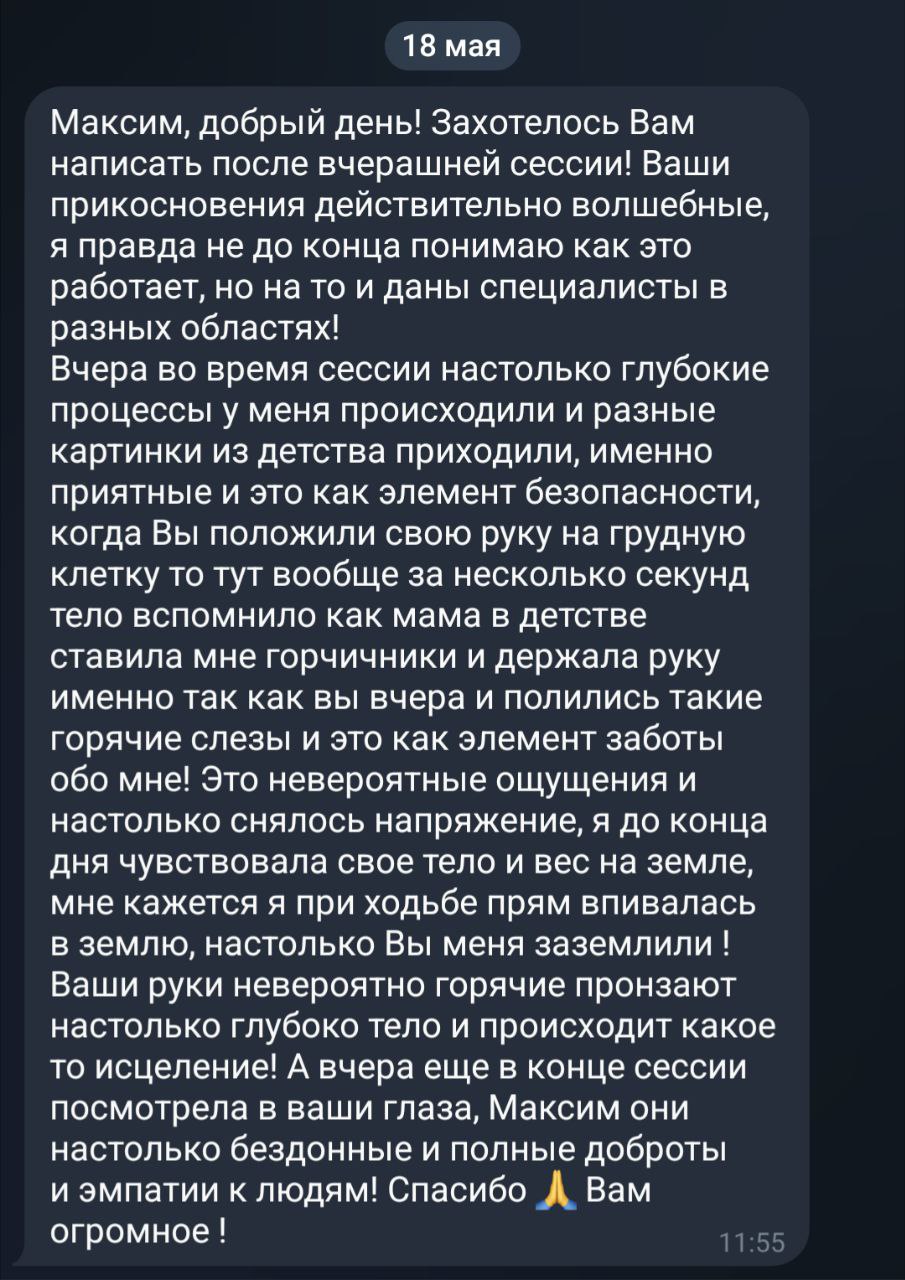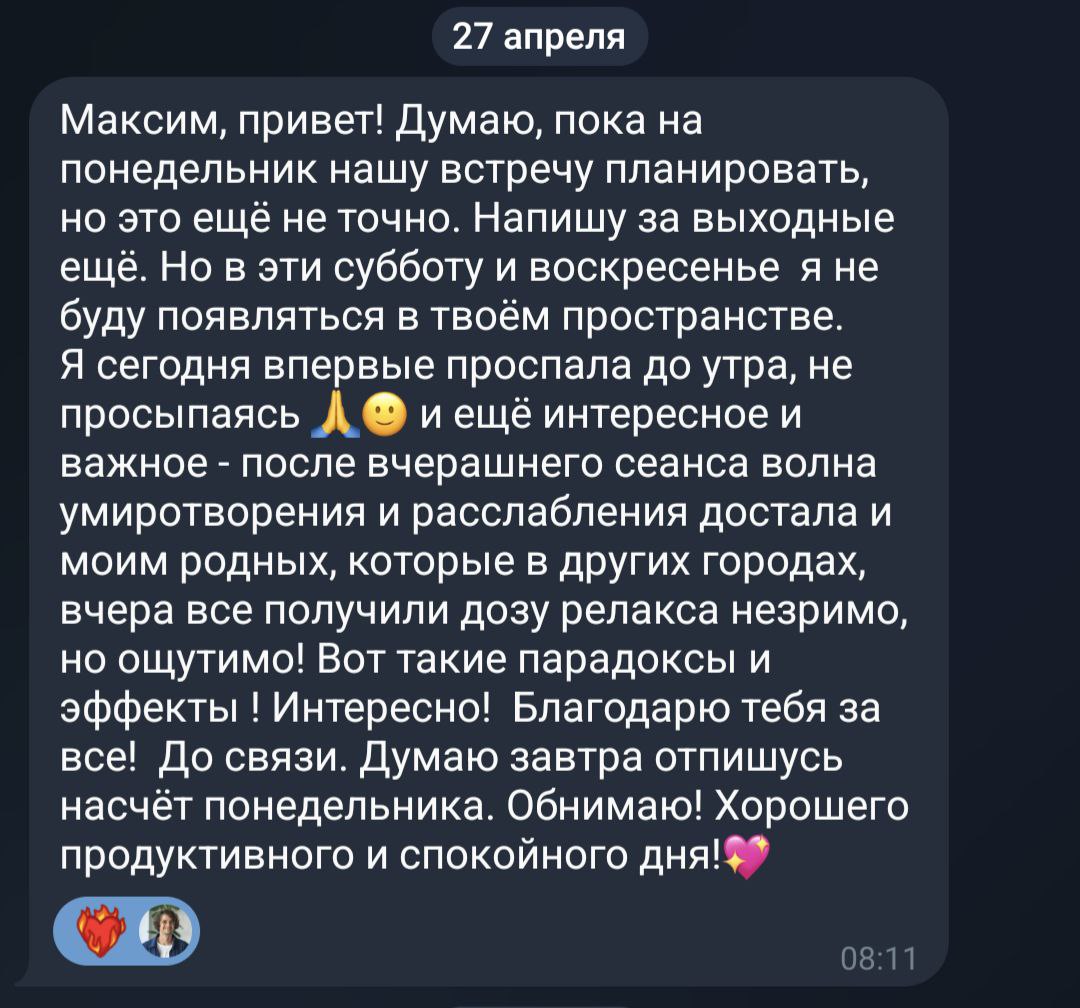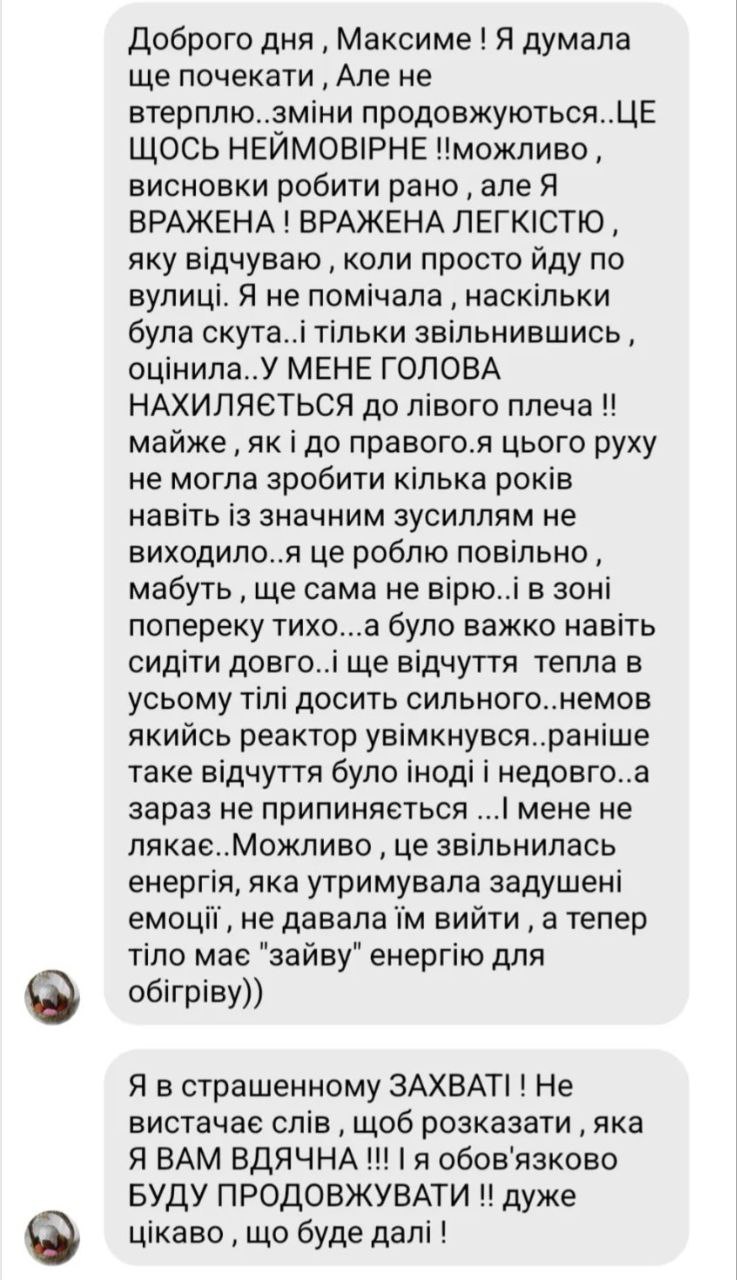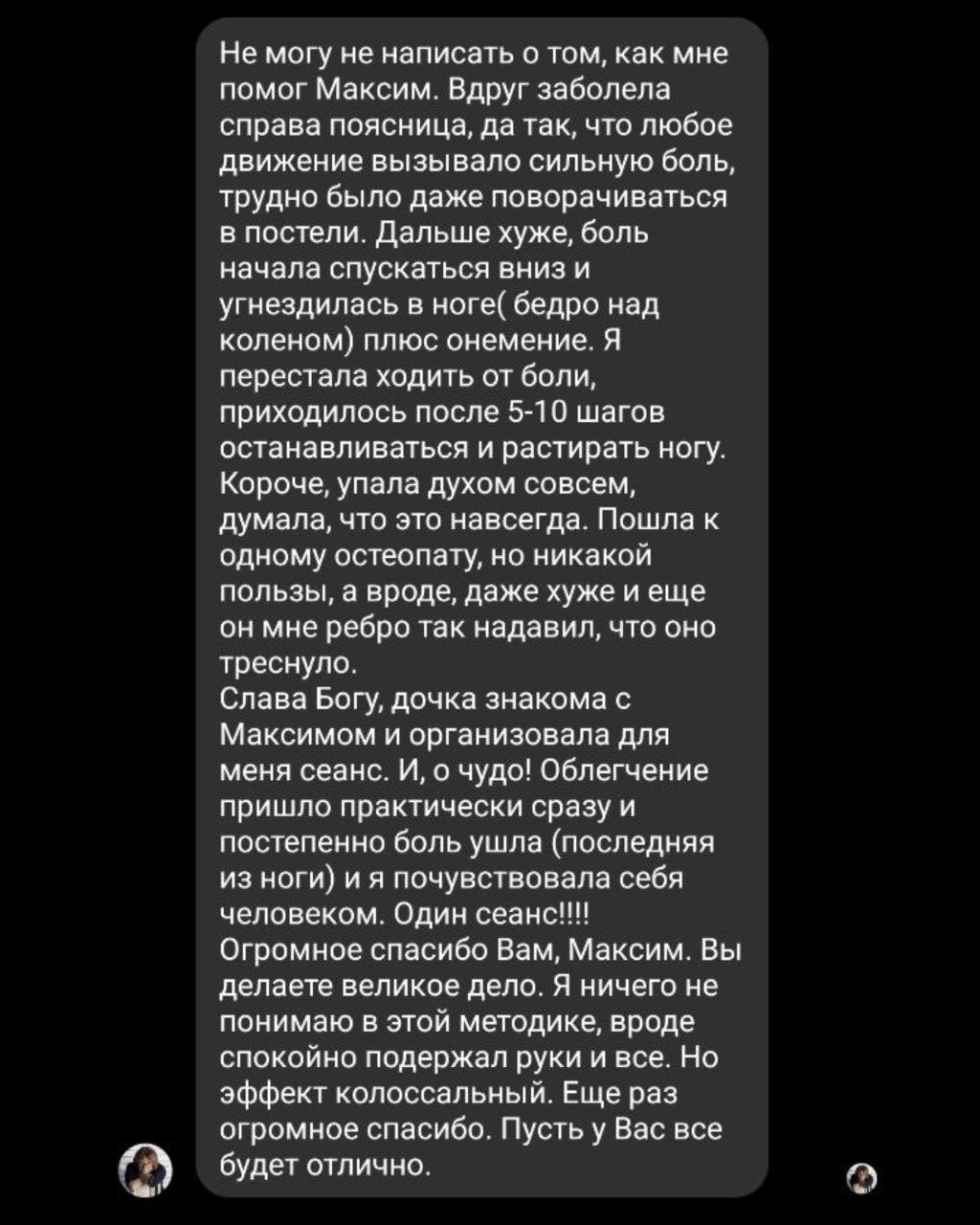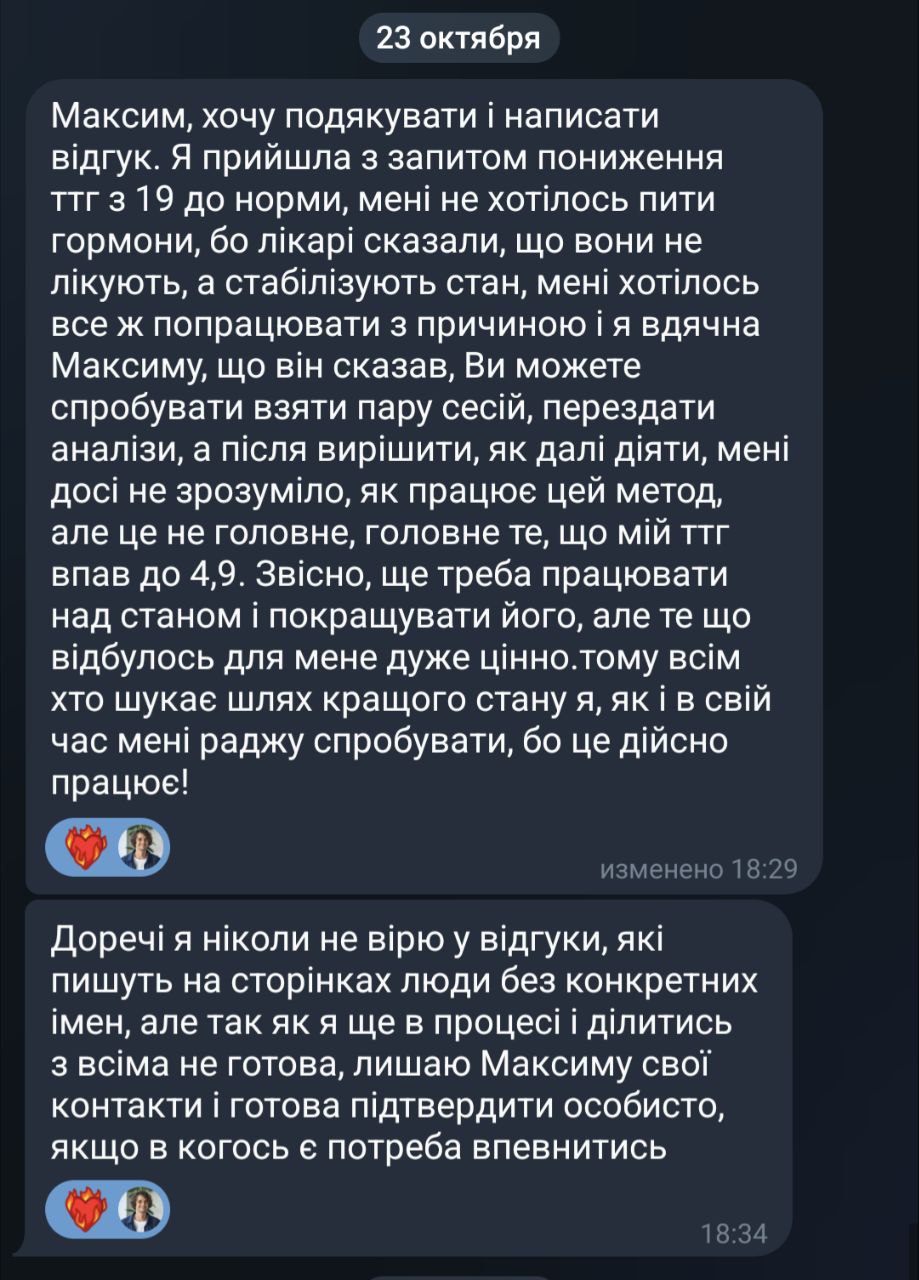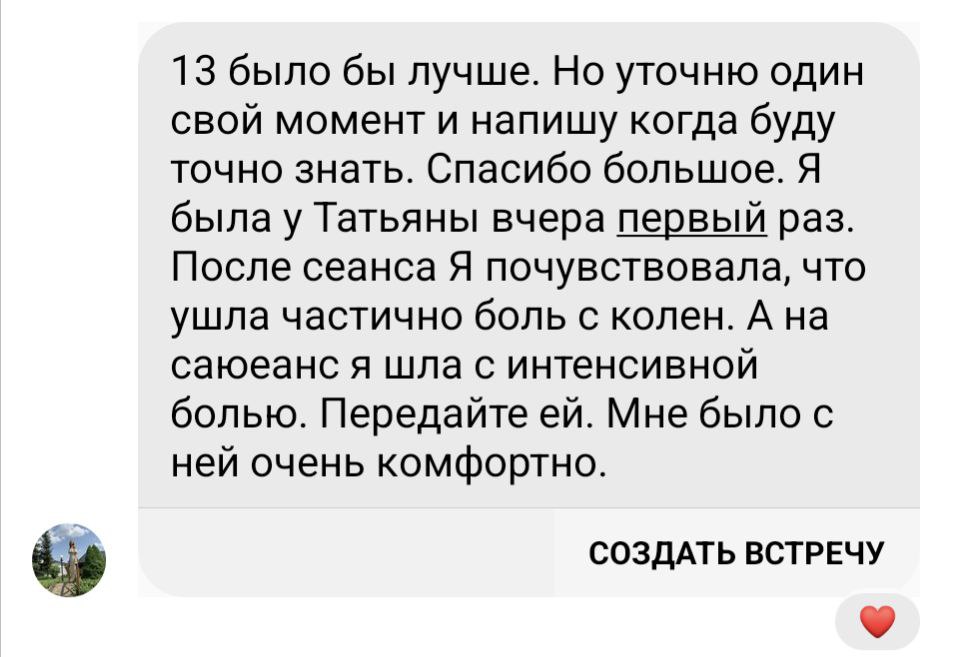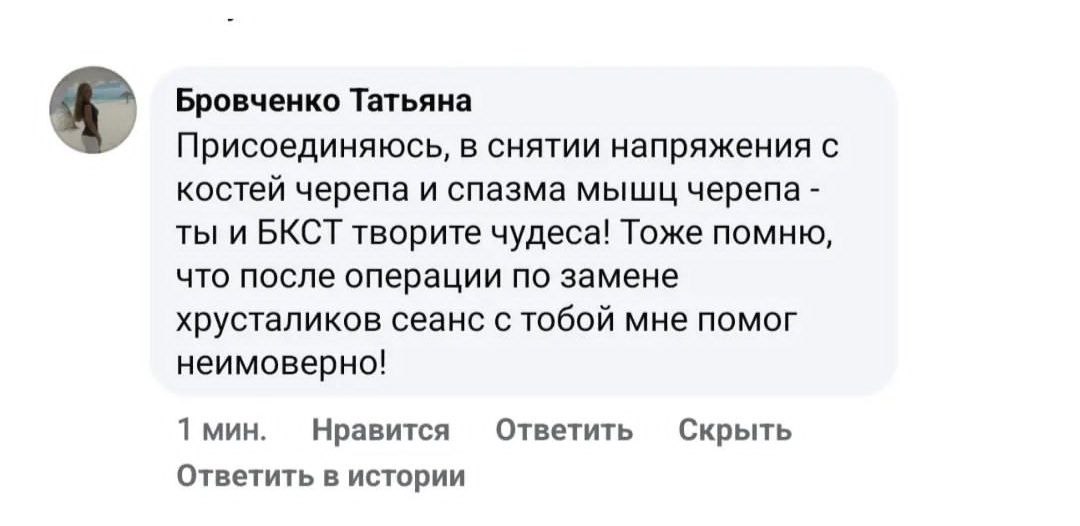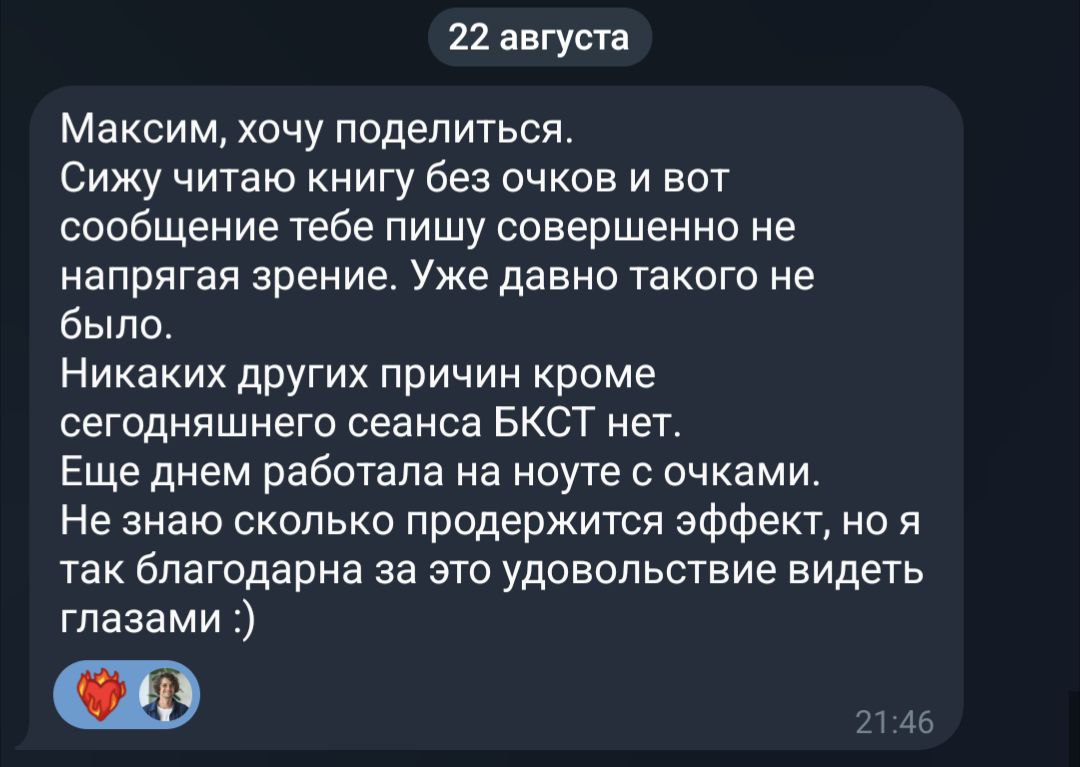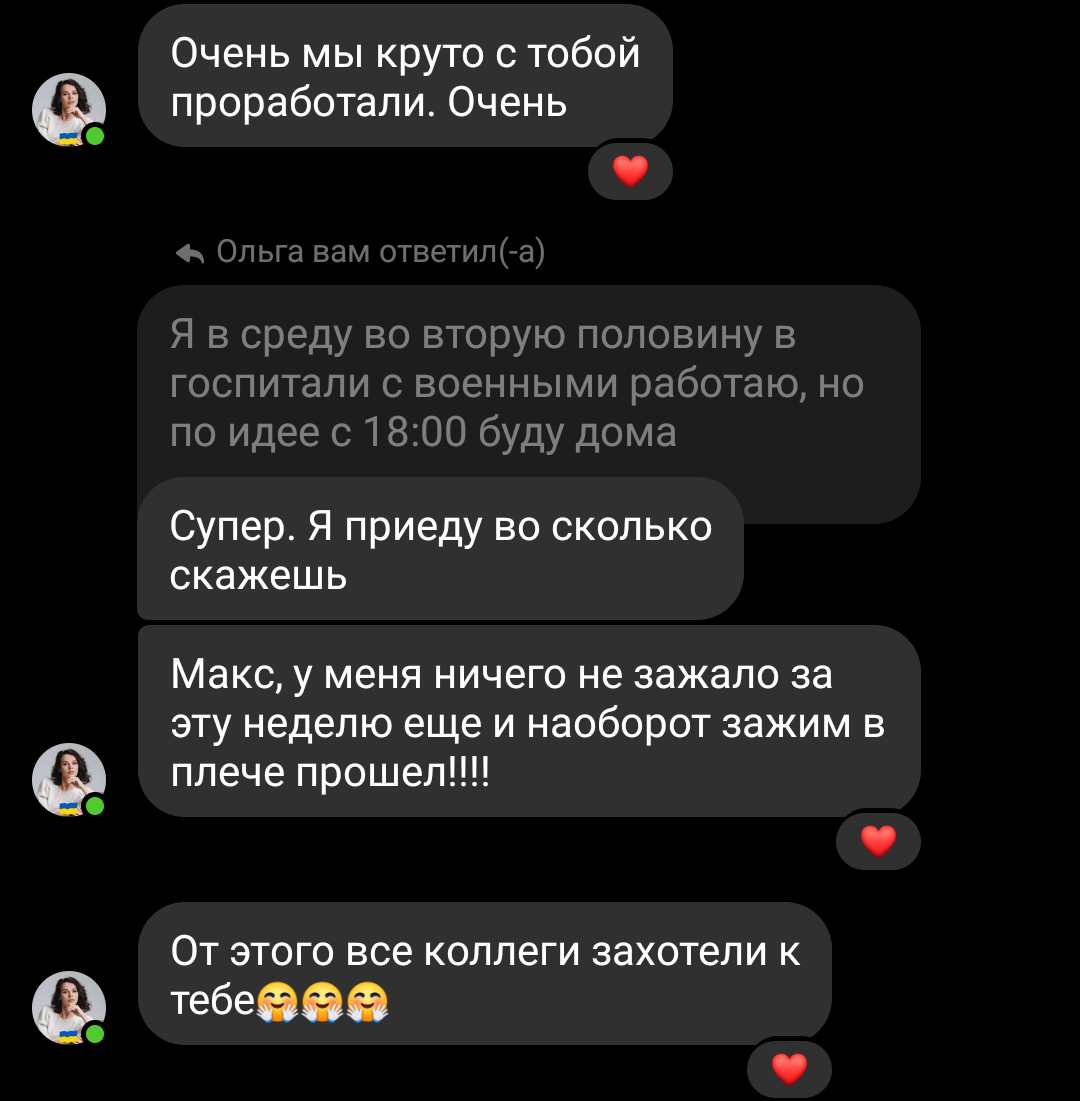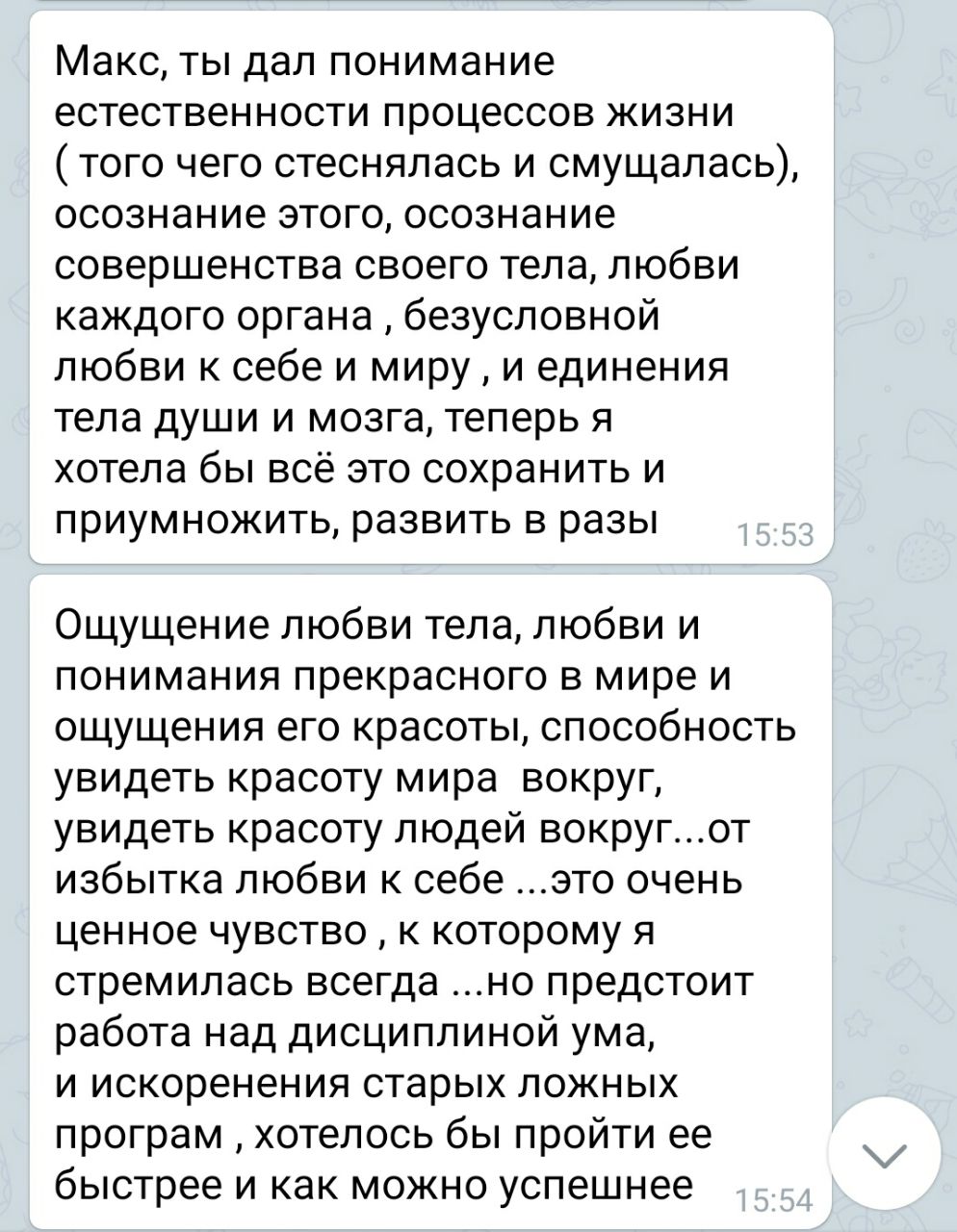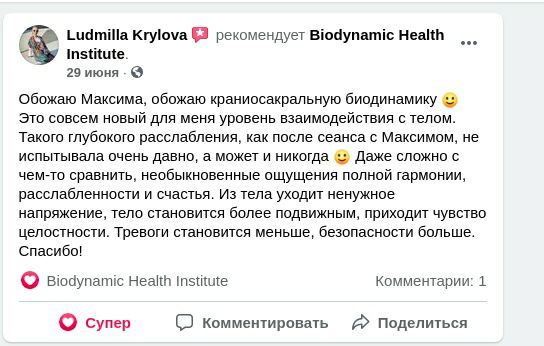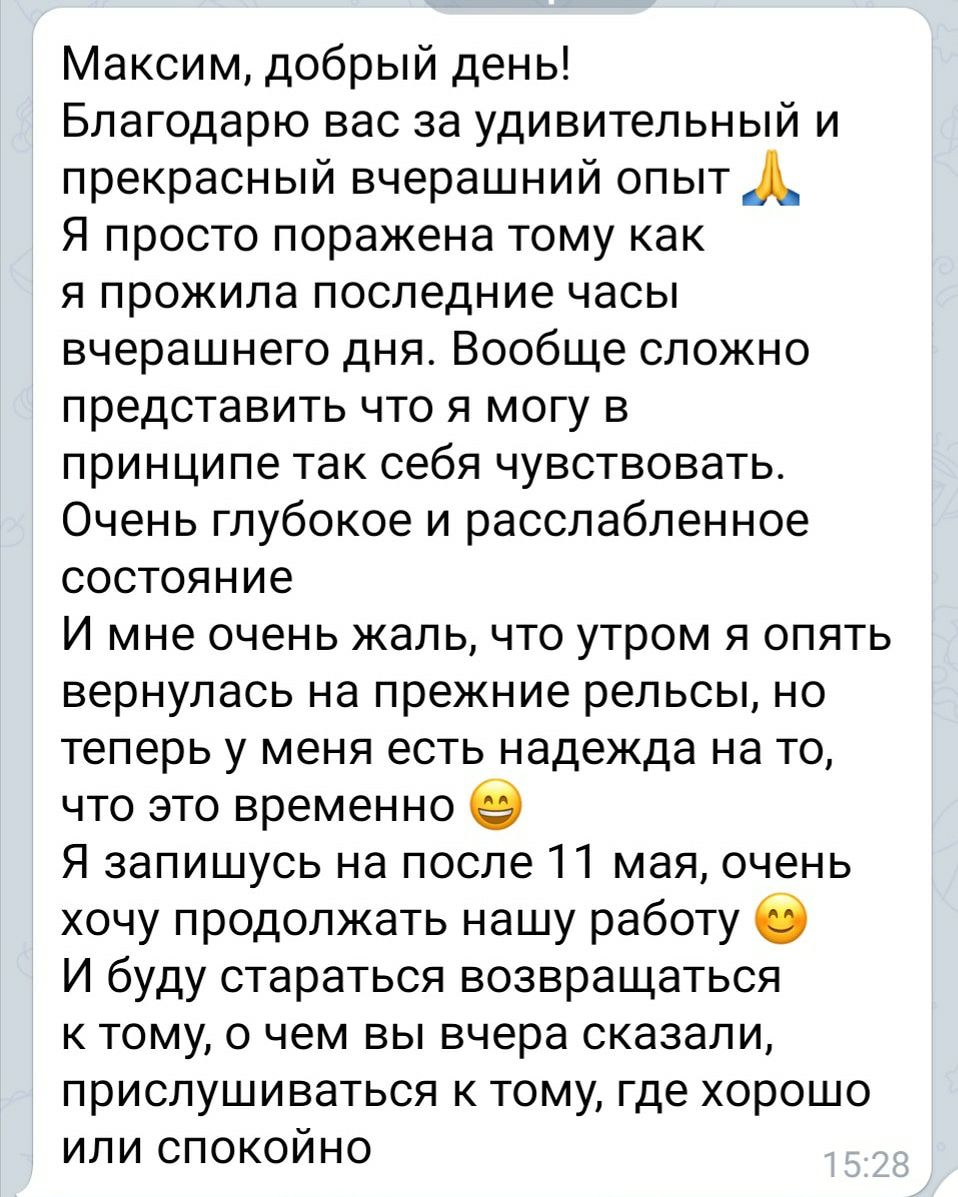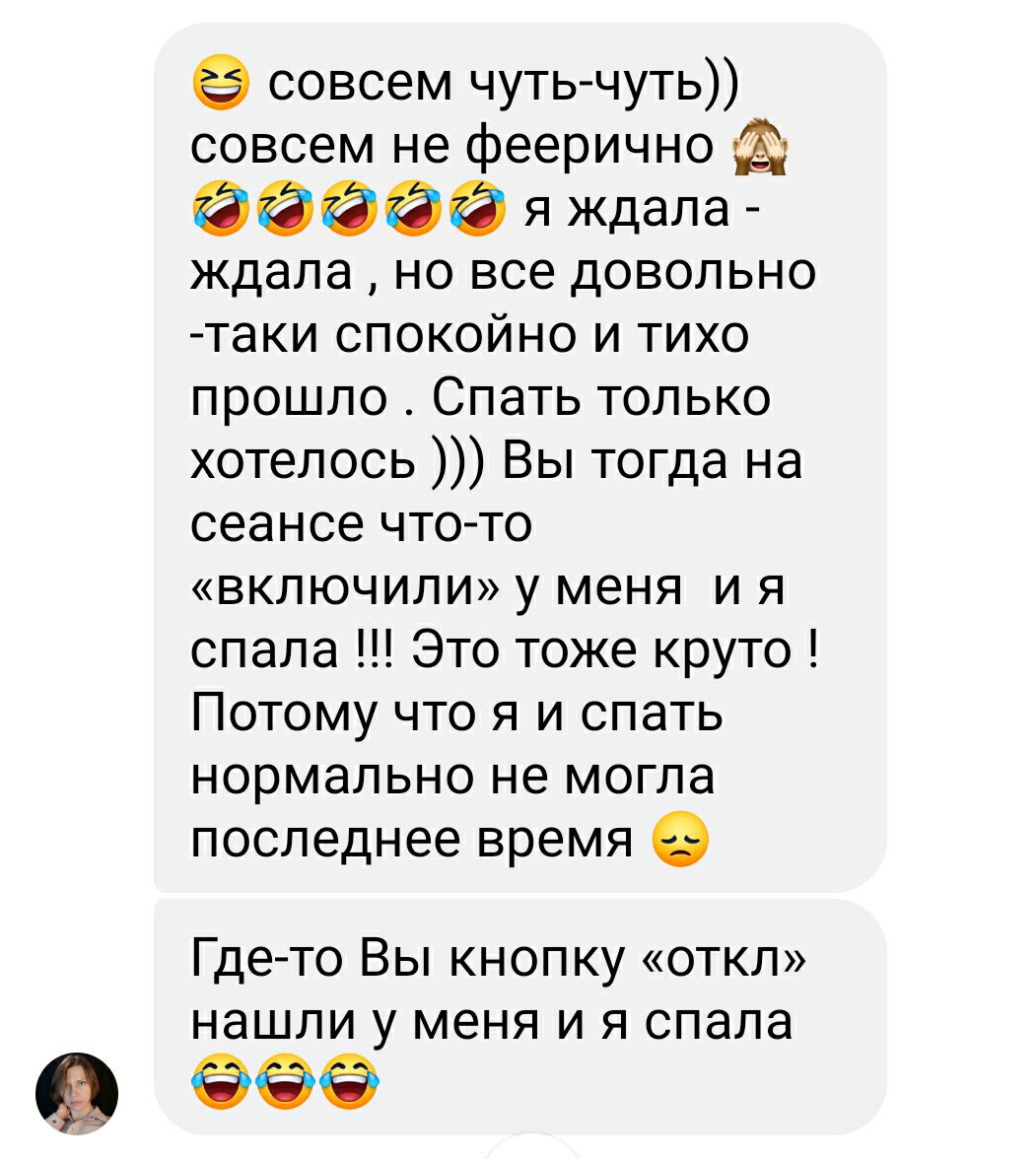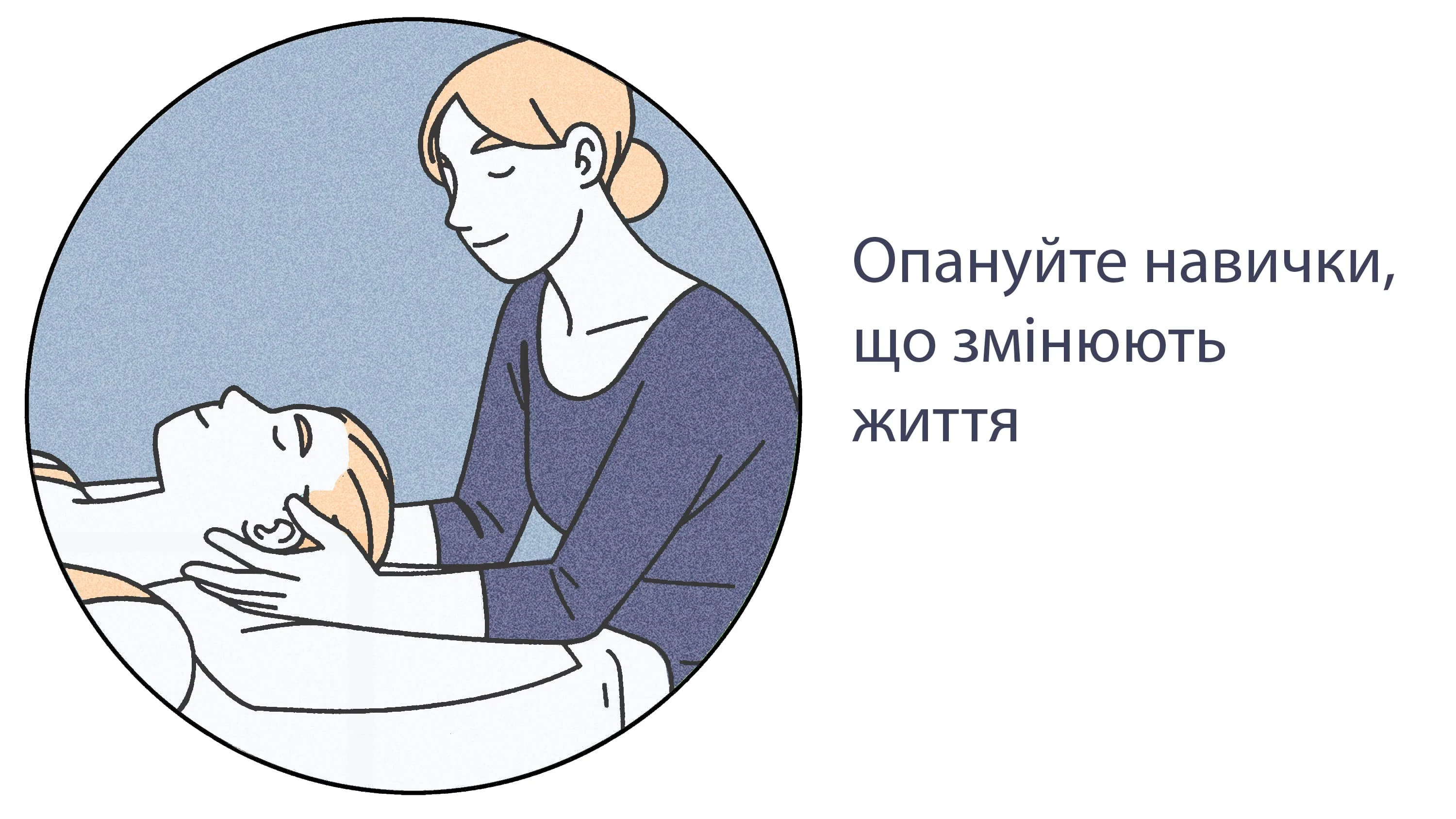
Biodynamics training (BCST) in Ukraine
We are now accepting applications for the second stream of training, which will begin on November 27, 2024. If you feel called to become a Biodynamic Craniosacral Therapist, then we invite you to get acquainted with our International two-year training program with world-renowned teachers and one of the best certifications in the world. Our Institute was formed around the idea to develop the quality of Biodynamics in Ukraine, purity in teaching and support of students in practice. We take care to graduate highly qualified specialists who are able to produce consistent and repeatable results in therapy. Our training combines both the classical roots of therapy and the latest developments in the field of anxiety, pain and trauma therapy.
What does the biodynamics training process look like
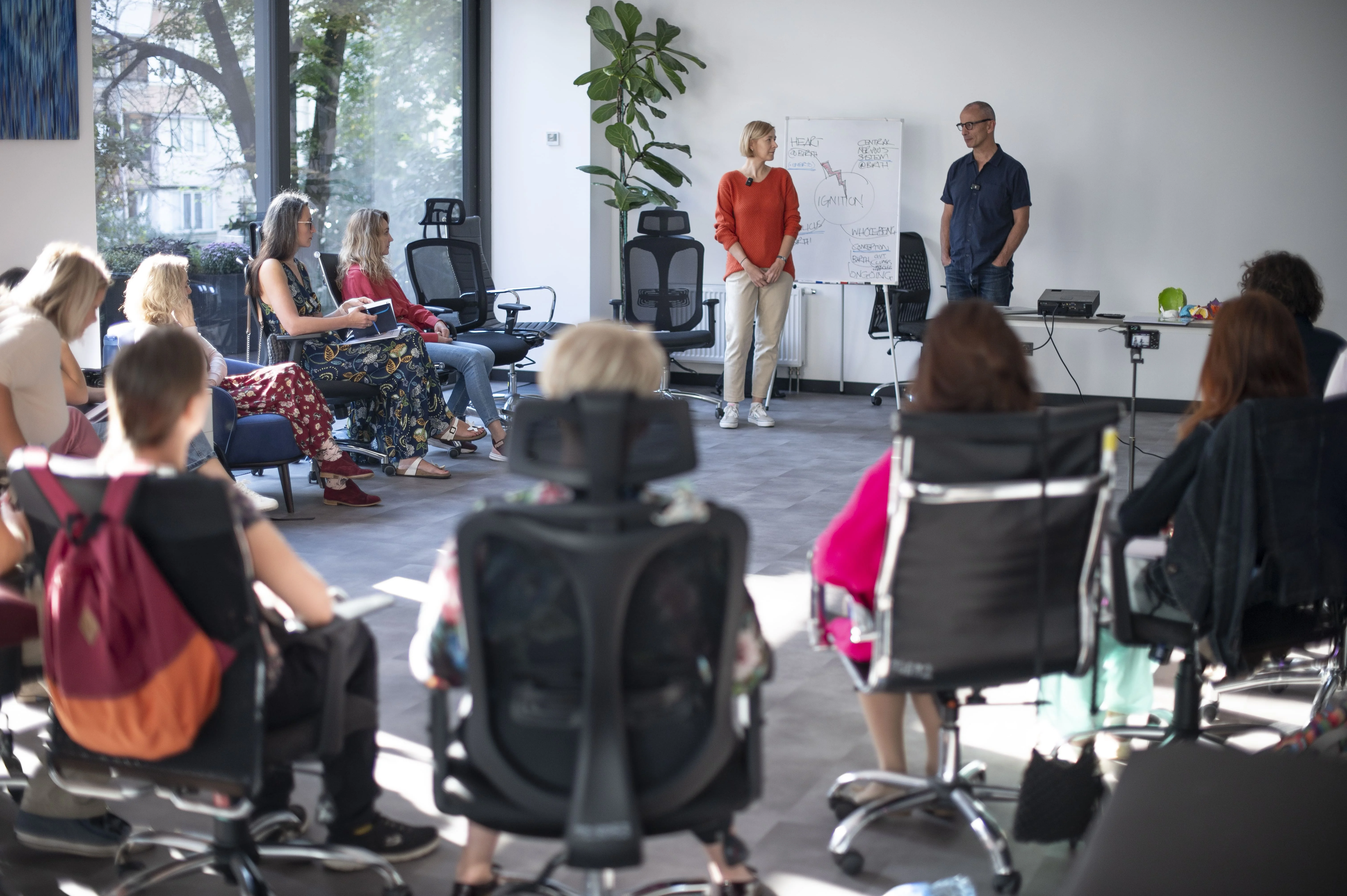
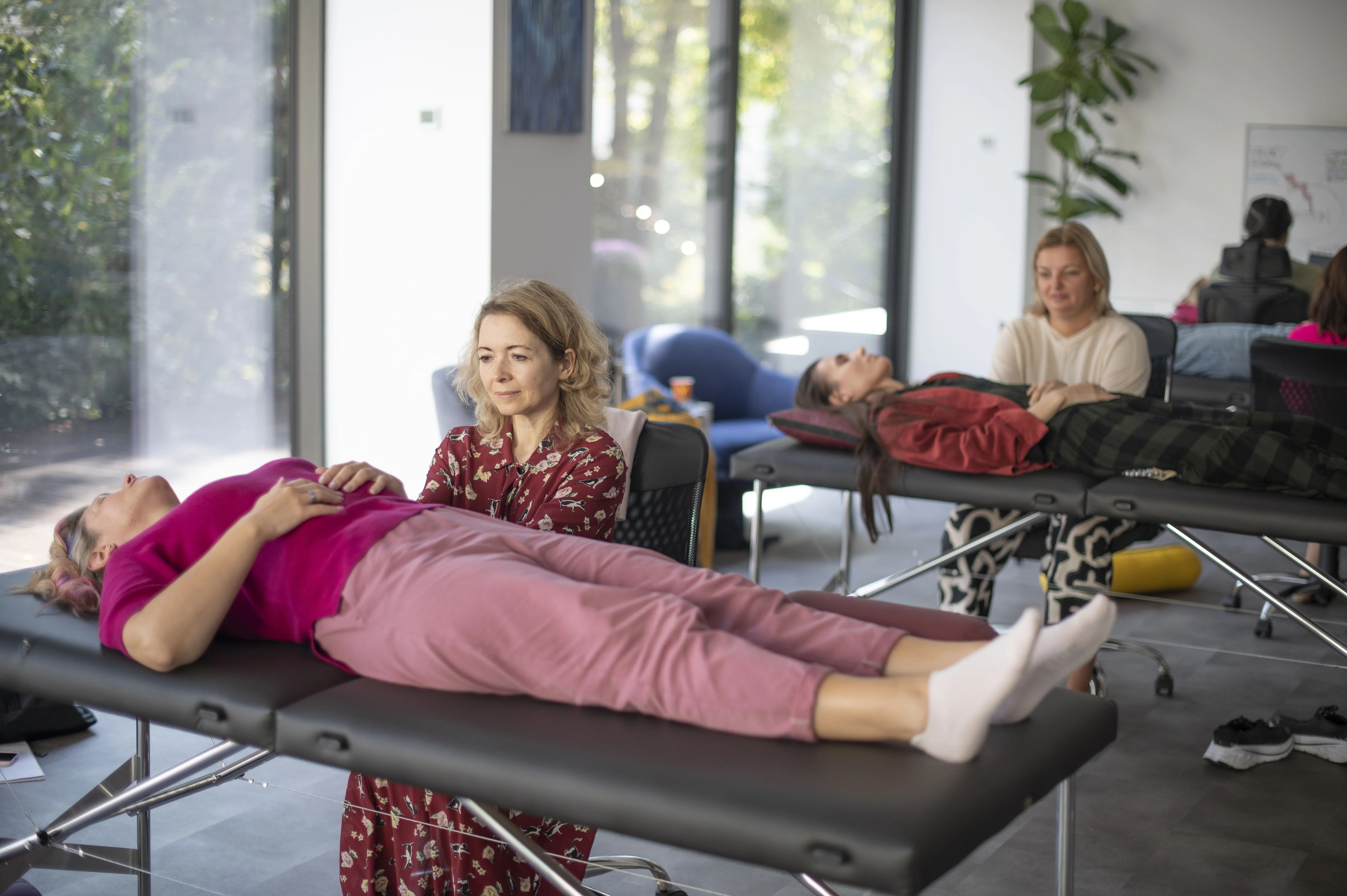
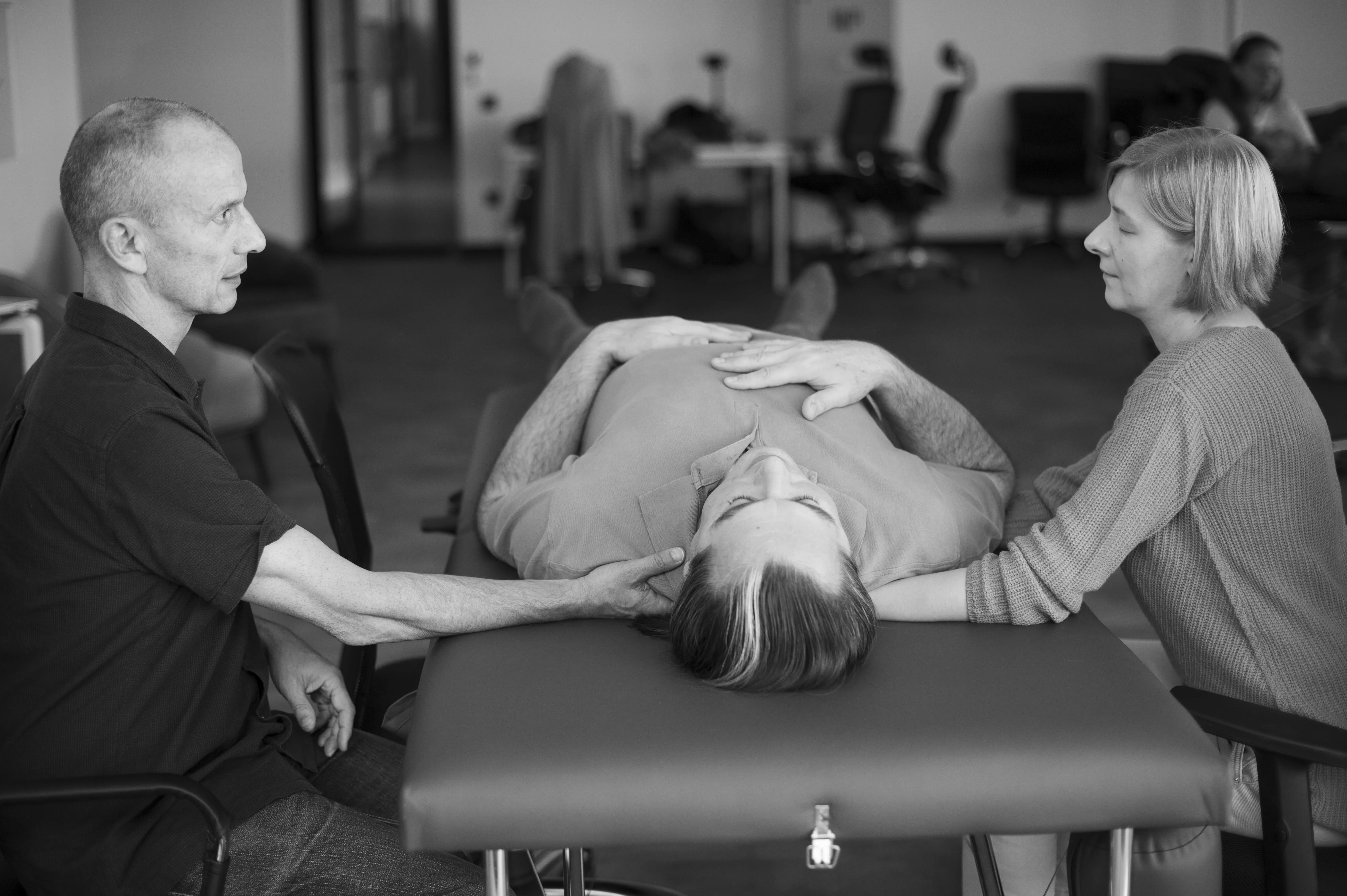
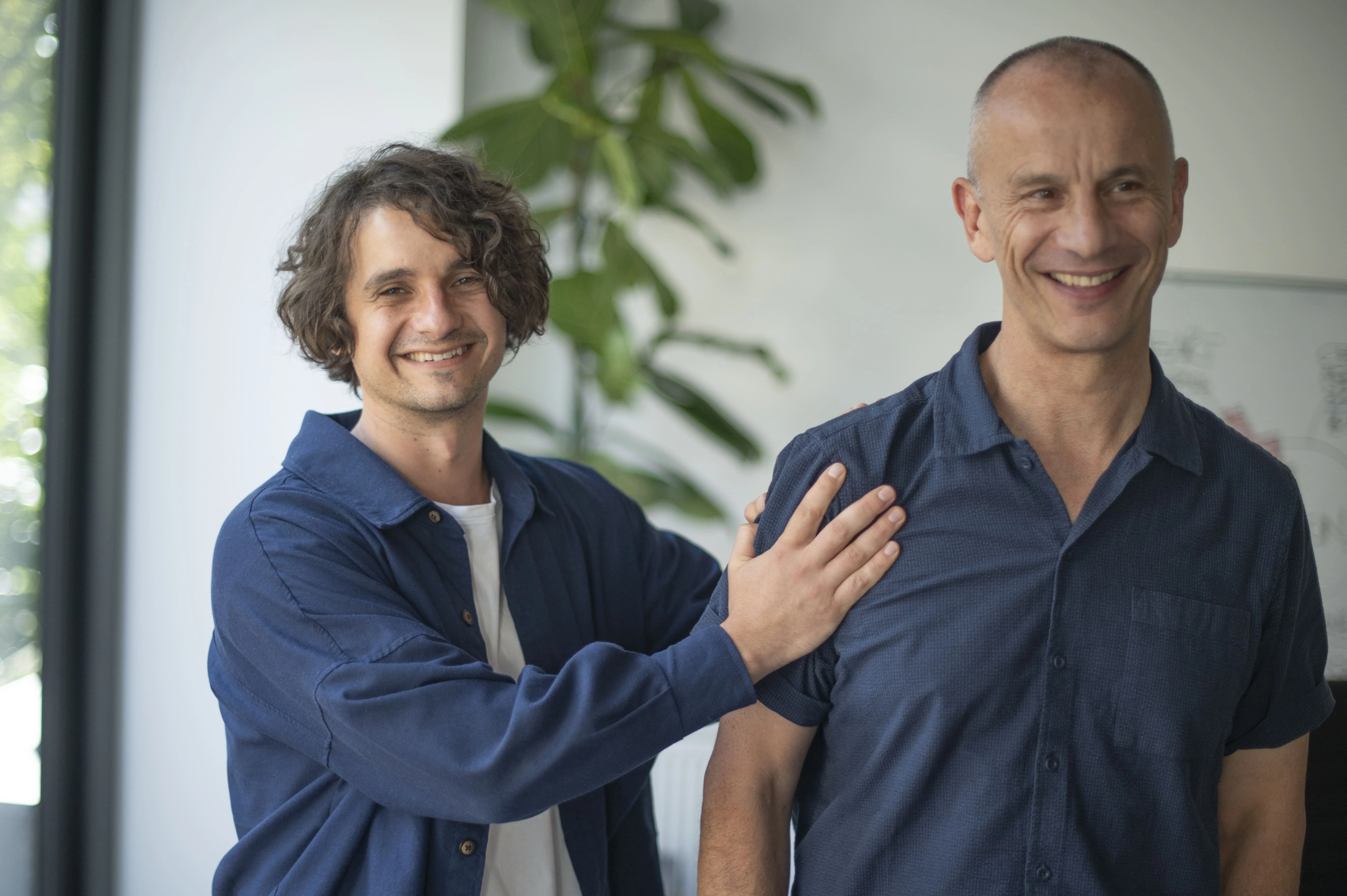
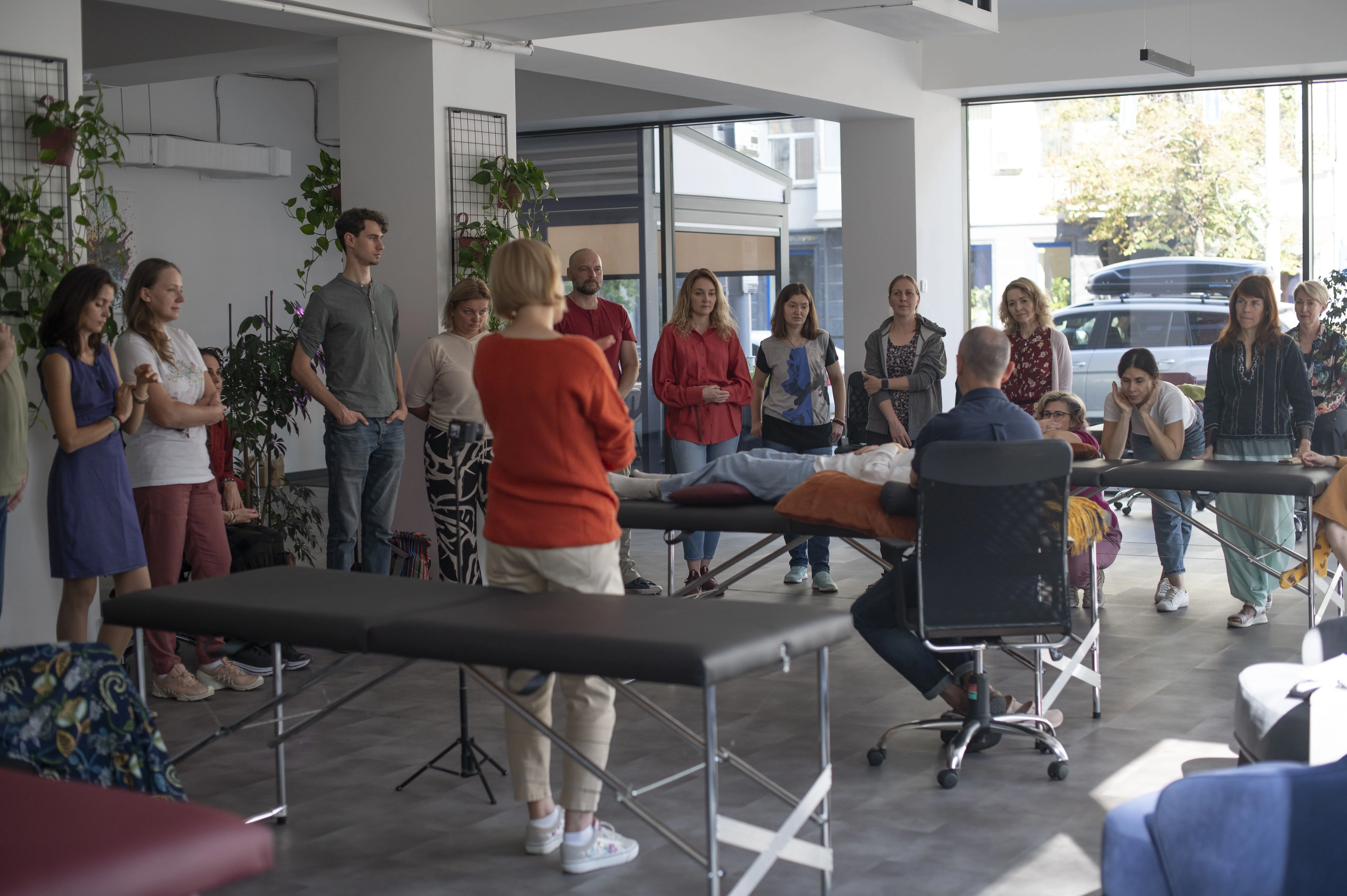
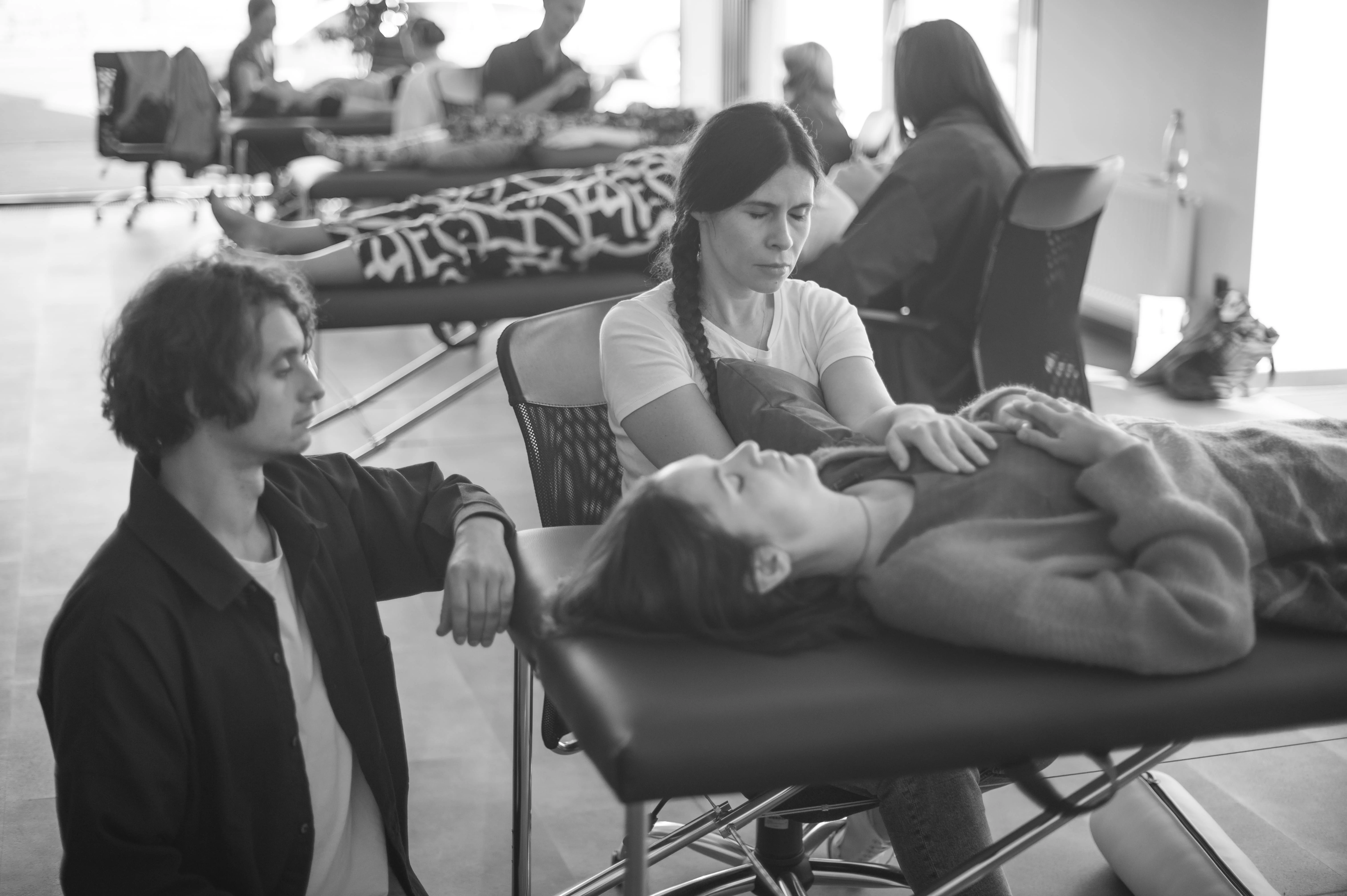
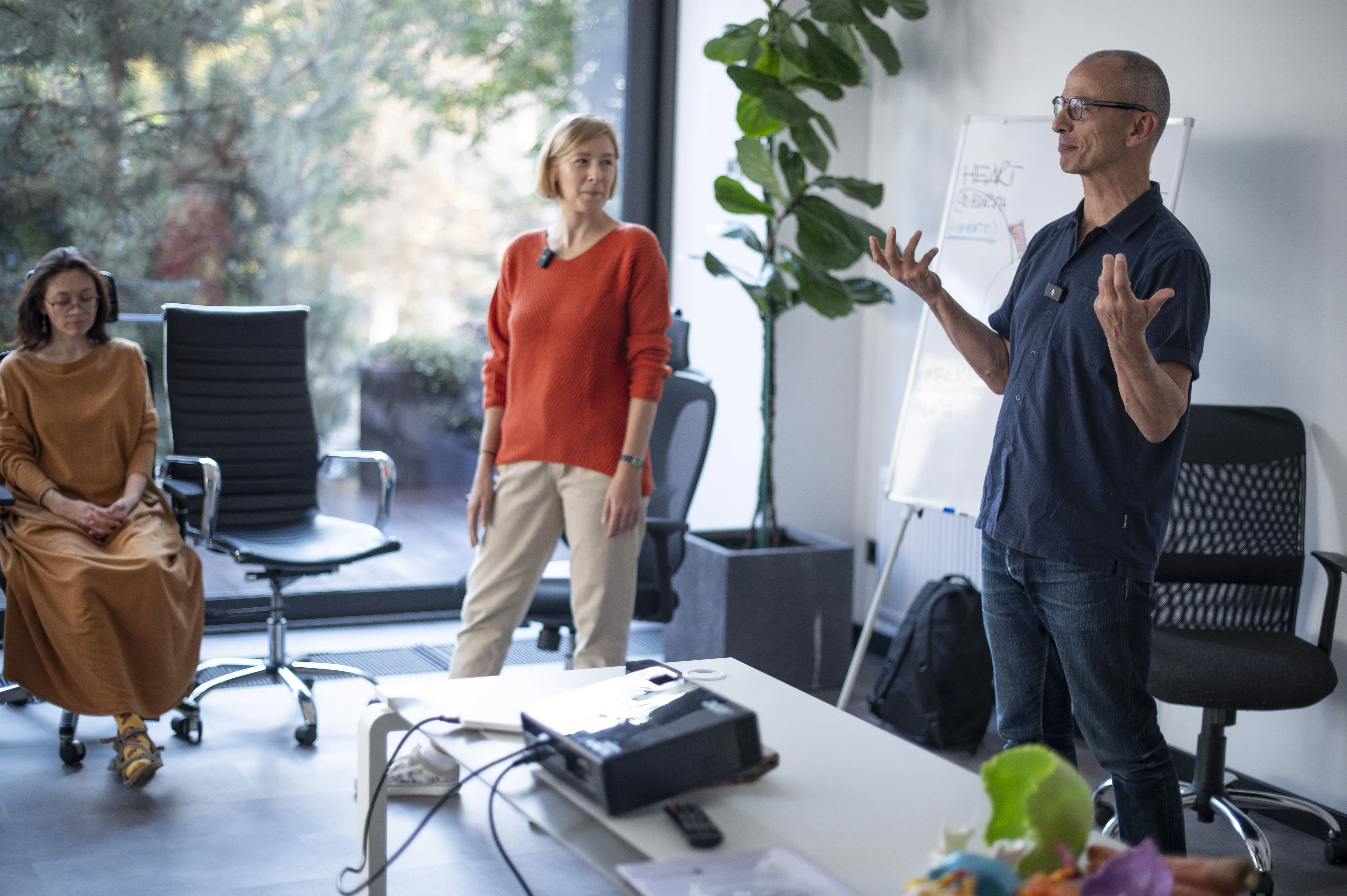
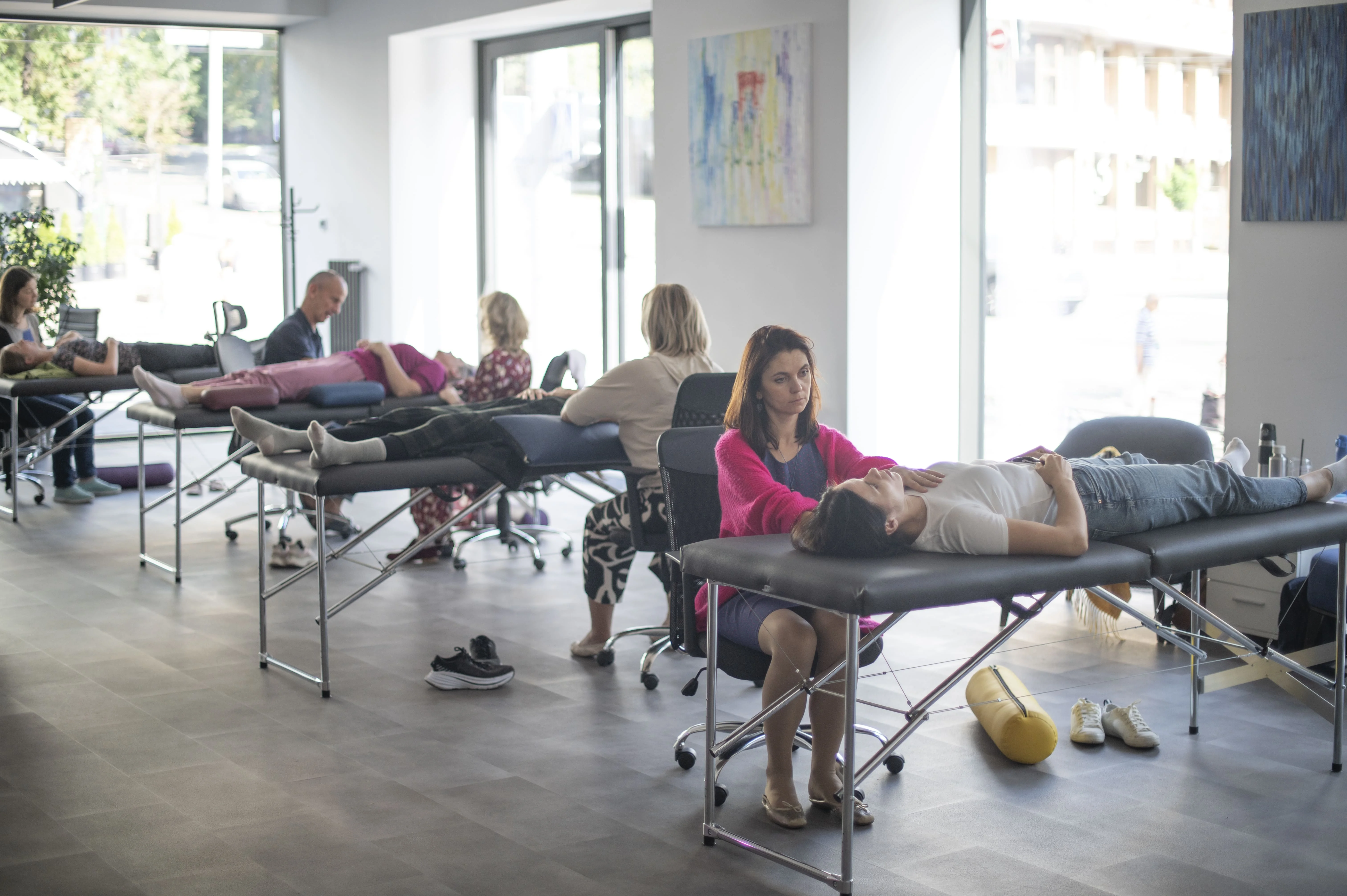
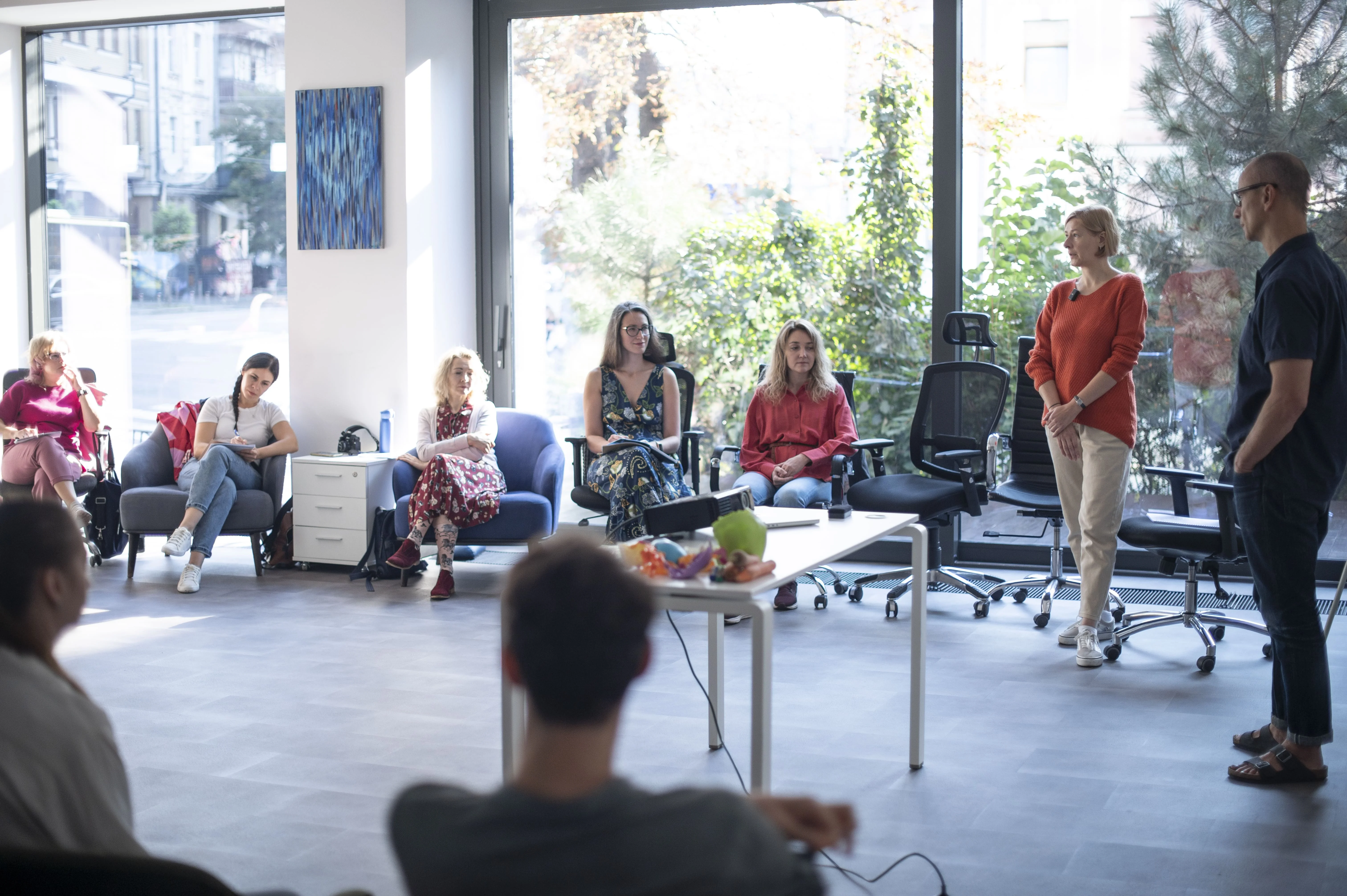
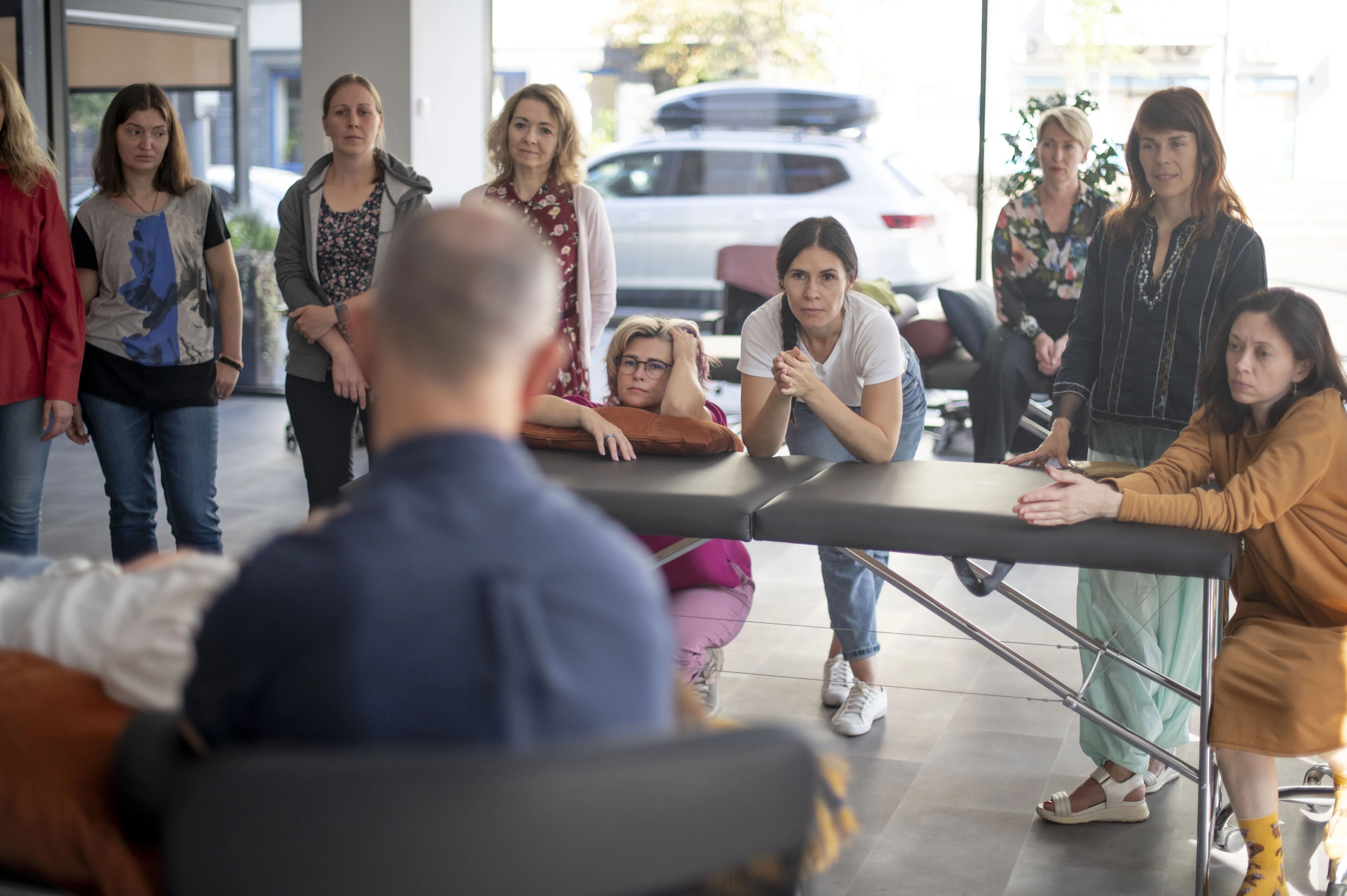
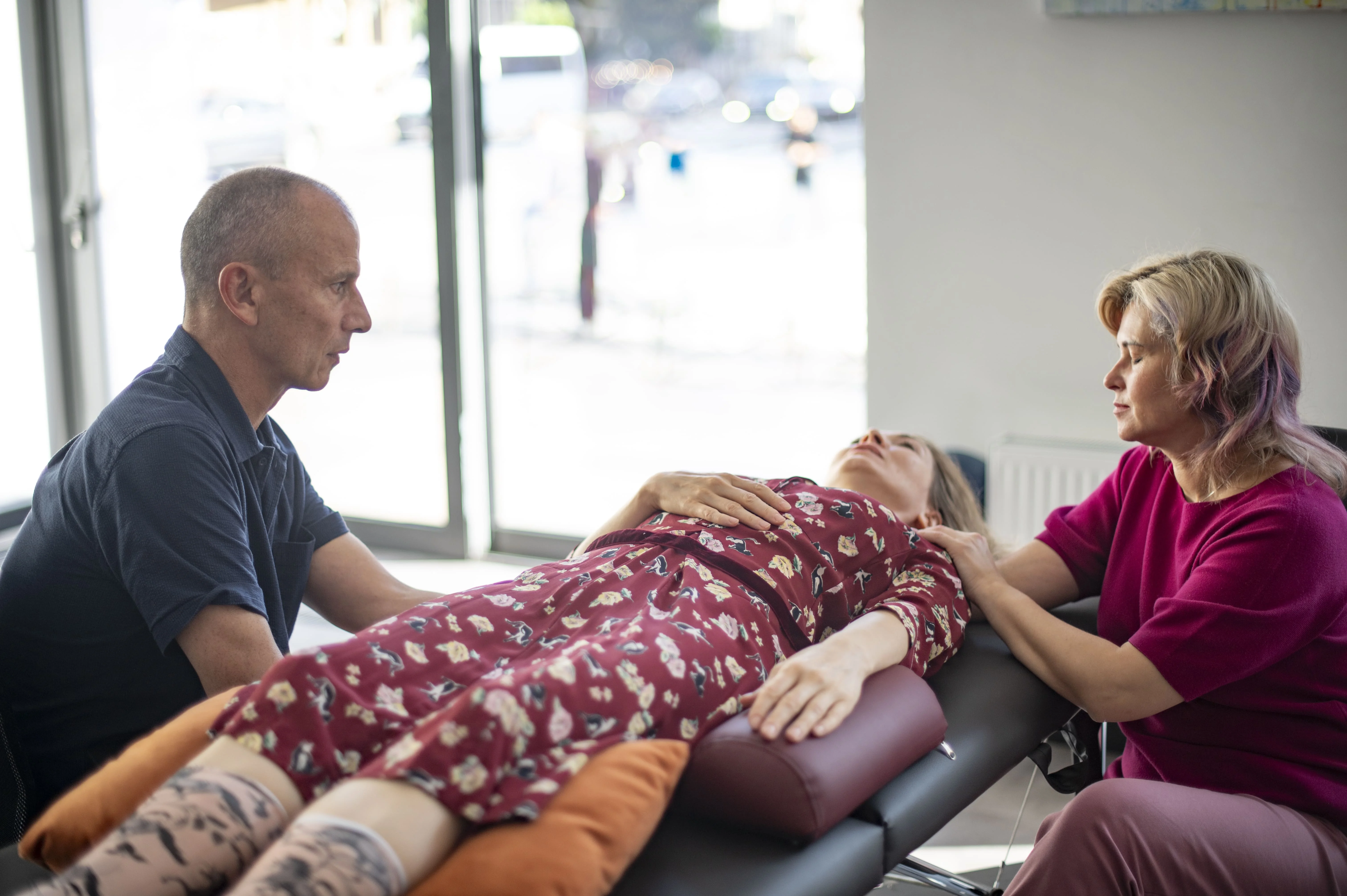
Photos from the 2021-2024 course were taken in Kyiv in September, 23rd
About the biodynamic approach
The biodynamic approach in craniosacral therapy involves a shift in perception from the various symptoms and patterns of experience (compression, pathology, trauma, etc.) held by the body to the internal forces that organize them. Instead of applying a blind force from the outside, aimed at eliminating the symptom, we teach to focus on the whole person and on the deep forces of health, which are felt by trained hands as subtle movements of tissues and fluids. We teach Biodynamics as a deep body therapy where real change is initiated by the wisdom of the body. Students will learn to follow the inner healing plan, to support the body's inner drive from fragmentation to health and the process of natural reorganization.
Latest developments
The key skills are mastered in conjunction with the study of neurobiology, embryology, anatomy, physiology, and modern trauma and pain research. We teach therapeutic work with defense mechanisms (activation and dissociation) that arise when a threat is perceived and are the cause of many diseases. We teach students to maintain safety, help clients find life resources, and live the side effects of trauma in manageable amounts and in peace.
Art of touch
During the training, special attention is paid to the development of palpatory, perceptual and therapeutic skills, which the practitioner can integrate step by step. To be skillfully aware of the subtle movements and qualities of the body, it is necessary to develop a high degree of sensitivity. That is why we practice body awareness, and discover the anatomy through self-knowledge. Body awareness develops the ability to distinguish between tissues and structures within your own body and, ultimately, in the body of your patient. It is also important for the ability to work with somato-emotional patterns, both your own and your clients'.
Learning process
The training consists of 10 five-day seminars over a two-year period. This period of time is necessary so that key skills can be developed through regular practice. The workshops are a powerful learning experience and are a combination of oral teaching, discussion, small group research and hands-on bodywork. The information and skills learned in each workshop build on each other and are developed in subsequent workshops. There are a number of elements that run throughout the course that form the basis for successful practice: rapport and treatment skills, understanding the treatment process, practice management, and self-development.
Integrity of learning
The training includes practice between seminars, homework, personal therapy, and a system of ongoing evaluation with regular feedback. The development of practical skills is based on the student's own research and therapy experience, supported by the support of teachers and assistants. At the end of the first year, there is a self-assessment program to help clarify any areas of uncertainty. In the second year of training, there is a case study program offered to develop your understanding of the practice and treatment processes.
Training plan for biodynamics
-
Touch in the relational field
Study of the phenomena of touch, space, perception and forms of the Tide. In-depth study of the concept of craniosacral biodynamics.
- - A touch in the relational field
- - Holistic Shift
- - Unfolding the Breath of Life
- - Field of Perception
- - Calm
- - Resources
- - Patterns of experience
- - Innate treatment plan
-
Duration: 5 days
-
Midline
Study of the spine as a functional unit and natural center for the health of the whole body, as well as a conductor of the primary energies of the mind-body continuum. Observation of natural changes around this axis.
- - Embryological Origins
- - Primordial health and the health project
- - Primary midline
- - Integral spine
- - Two poles - sacrum and occiput
- - Dynamics of spinal motion
- - Fluid structures of the spine
- - Major joints
- - Natural states of balance
- - Tissues, fluids and potency
- - Body Cognition
- - Recognising and treating the effects of injury
-
Duration: 5 days
-
The dynamics of body wholeness
Exploring the principle of wholeness. When the body expresses a communication and moves as a whole, we access greater health. The study of the inextricable connection between tissues, patterns and forms of the whole body. Also the study of mutual movement in the body.
- - Connective tissue
- - Fascial network
- - Reciprocal movement in membranes
- - Horizontal and transverse structures
- - Body as a unit, field as a unit
- - Working with whole body patterns
- - Trauma patterns
- - Hip and shoulder joints as key nodes in the fascial network
- - Wide Fields of Perception and the Long Tide
- - Practice development: assessment skills, diagnostic basics, language to describe touch, treatment records
-
Duration: 5 days
-
Сraniopelvic resonance
The study of primary breathing in the area of the skull and pelvis. The study of the mutual reflection of the two poles of the midline and the healing effect of their synchronization.
- - Mobility and motility (mobility) of the skull vault and pelvic bones
- - Patterns of experience
- - Specific resonances
- - Bipolar contact
- - Integration and resources
- - Bone-membrane manifestations
- - Core-periphery resonance: midline and limbs
- - Practice development: treatment session structure, therapeutic processes, safety in practice.
-
Duration: 5 days
-
Birth, ignition and primary health
Research on prenatal development and prenatal conditions for health. Biodynamics can make contact with these early forces and help redistribute early influences. The study of the process of birth and how the body is reorganized in response to this unique event.
- - Prenatal experience and the soul
- - Skull base patterns and their resonance
- - Whole body shape at birth and posture
- - Understanding self-synchronisation
- - Ignition processes
- - Implications related to attachment establishment and bonding
- - Understanding the suprapersonal
- - Pace regulation and containment
- - Practice development: increasing confidence in bodily intelligence, diagnosing health and assessing change
-
Duration: 5 days
-
Visceral intelligence
The study of the sensations and movements of organs - their embryological origin and expression of initial health. Studying the possibilities of a profound effect of therapy on their physiology.
- - Visceral Nervous System
- - The "fight-or-flight" response and the brainstem
- - The limbic system and emotion
- - Individual organ expressions and clinical considerations
- - The intestine and cord-related sequelae
- - Physiological manifestations of calmness
- - Practice development: acute and chronic conditions, working with serious illness, relationships with short, medium and long term clients
-
Duration: 5 days
-
Neural matrix
The study of the fluid/electrical phenomenon of the central nervous system in the very center of our body. In particular, how the brain senses and responds to light touch. We consider establishing a connection with neural patterning to create smoother neural flow dynamics.
- - The brain in its integrity
- - Neural Flow
- - Ventricles and deep reservoirs of potency
- - Blood and brain
- - Brain states and nerve facilitation
- - Understanding the nature of pain
- - The state of calm in the central nervous system
- - The Sea of Calm
- - Practice development: how to become a successful, fulfilled craniosacral therapist, how to stay afloat while working for yourself
-
Duration: 5 days
-
Facial complex
The study of the dynamics of the face and the senses. Consideration of how the face functions in relation to the cranial skull, the body in its integrity and various relationships. In particular, the study of the crucial relationship of the jaw and throat to the body as a whole and how this forms the fulcrum for powerful physiological and psycho-emotional expressions and inhibitions.
- - Cranial nerves and sensory organs
- - Facial movements and emotions
- - Dynamics of the hard palate
- - Jaw and TMJ harmonics
- - Emotional entrapment and its expressions
- - Shock and the jaw
- - Vertical axis of the throat
- - Key joints of the lower body
- - Empathic Practitioner
- - The power of recognition and non-recognition
- - Practice development: structuring the physiology of emotion and pain, developing presence and simplicity in the treatment session
-
Duration: 5 days
-
A deeper dive into the relational field
Pregnancy, childbirth, and early life are profound periods of formation. These first moments can define many aspects of our health and nature that will affect the rest of our lives. Craniosacral therapy offers a deep understanding of these events and, through a unique and deep contact with the human system, can facilitate the manifestation of the innate life force in each individual. The effective use of these skills can help the development of the embryo, fetus, child and mother.
- - Mother and Child Resonance
- - Treating the pregnant woman and recognising the presence of the baby
- - Physiological changes during pregnancy
- - Conditions that can develop in the intrauterine period
- - Natural childbirth
- - Complications of childbirth, the medical model through the cranial prism
- - The postnatal period and the changes that occur
- - Treating the mother and baby for the first time
- - Expressions of health / expressions of trauma in mothers, infants and children
- - Physiological differences in the young child
- - Treating infants from 8 to 18 months of age
- - Maintaining practitioner neutrality in challenging circumstances
- - Developing verbal skills
- - Presence skills
- - Practitioner self-help and the role of supervision in practice
-
Duration: 5 days
-
Cellular intelligence
In this seminar, we will explore how the body's response is holistic in nature. The nervous system, endocrine system, and immune system are inextricably linked and complementary, exerting a joint influence on our emotional and psychological states. Attachment theory and neuroscience will be examined as theories that contribute to our understanding of what lies behind physical and emotional adaptations along with practical ways to bring this knowledge into the treatment room and practice a truly holistic approach to your client's system.
- - Hypothalamic-pituitary-adrenal (HPA) axis phenomenon
- - Metabolic fields and the thyroid gland
- - Potency of the immune system and immune organs
- - Molecular fluid hormonal matrix
- - Regulation of the neuroendrocrine immune system
- - Understanding the stress/inflammatory response
- - Practice development: building your practice, legal requirements, continuing development
-
Duration: 5 days
-
Interseminar learning
Writing assignments, practice, and personal therapy will help you to master the material and skills more deeply. It will also help you and the teaching team understand how you are progressing. We will provide you with regular feedback and support. The first category of assignments is completed before each subsequent seminar. The second category of assignments is completed throughout the course of the program and is due before the end of the program. Completion of all assignments is mandatory for certification.
- - Writing thematic essays
- - Final review and own questions
- - Practical session notes
- - Executing exercises with descriptions
- - Drawing of anatomical structures
-
Terms: min 14 days before the next seminar
- - Conduct 3 cases of 8 sessions each
- - Write diploma
-
Terms: min 14 days before the seminar 9
- - Conduct 150 sessions of free therapy as part of the training
- - Take 16 sessions of personal therapy
-
Terms: min 14 days before the seminar 10
Curriculum:
-
0 sem: The art
of therapeutic touch-
Start
29.06.2024
-
Сompletion
29.06.2024
-
Tutor
Maksym Usoltsev
-
Where
Kyiv
- >
-
-
1 sem: Touch in the relational field
-
Start
27.11.2024
-
Completion
01.12.2024
-
Tutor
Josef Steiner
-
Where
Kyiv
-
-
2 sem: Midline
-
Start
26.02.2024
-
Completion
02.03.2024
-
Tutor
Steve Haines
-
Where
Kyiv
-
-
3 sem: The dynamics of body wholeness
-
Start
21.05.2024
-
Completion
25.05.2024
-
Tutor
Steve Haines
-
Where
Kyiv
-
-
4 sem: Сraniopelvic resonance
-
Start
03.09.2024
-
Completion
07.09.2024
-
Tutor
Josef Steiner
-
Where
Kyiv
-
-
5 sem: Birth, ignition and primary health
-
Start
19.11.2024
-
Completion
23.11.2024
-
Tutor
Steve Haines
-
Where
Kyiv
-
-
6 sem: Visceral intelligence
-
Start
11.02.2024
-
Completion
15.02.2024
-
Tutor
Josef Steiner
-
Where
Kyiv
-
-
7 sem: Neural matrix
-
Start
06.05.2024
-
Completion
10.05.2024
-
Tutor
Steve Haines
-
Where
Kyiv
-
-
8 sem: Facial complex
-
Start
15.07.2024
-
Completion
19.07.2024
-
Tutor
Josef Steiner
-
Where
Kyiv
-
-
9 sem: A deeper dive into the relational field
-
Start
07.10.2024
-
Completion
11.10.2024
-
Tutor
Steve Haines
-
Where
Kyiv
-
-
10 sem: Cellular intelligence
-
Start
09.12.2024
-
Completion
13.12.2024
-
Tutor
Josef Steiner
-
Where
Kyiv
-
Tutors of the biodynamics training program
-
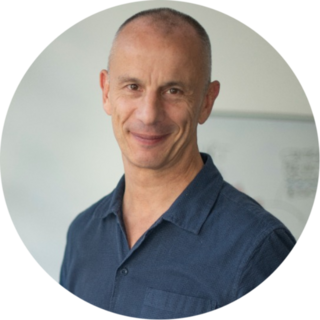
Steve Haines
Senior tutorSteve Haines has been a bodyworker for over 20 years. He is the author of the award-winning book "Anxiety Is Really Strange", which part of the graphic book series "Pain Is Really Strange", "Trauma Is Really Strange" and "Touch Is Really Strange" graphic books, which published in April 2021.
-
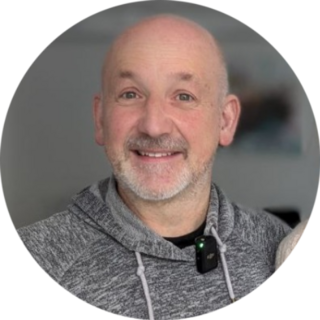
Josef Steiner
Senior tutorJoseph Steiner is an active therapist in craniosacral biodynamics and teaches breathing exercises and trauma releasing exercises (TRE) at his Naduire Therapy Center in Galway, Ireland.
-
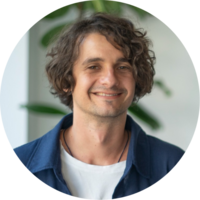
Maksym Usoltsev
Organizer and tutorFounder of the Biodynamic Health Institute. The first in Ukraine certified Biodynamic Craniosacral Therapist in Ukraine. Certified TRE provider, trauma therapist and hypnotherapist. Rehabilitation therapist and organizational psychologist by education. He has been teaching yoga since 2009.
-
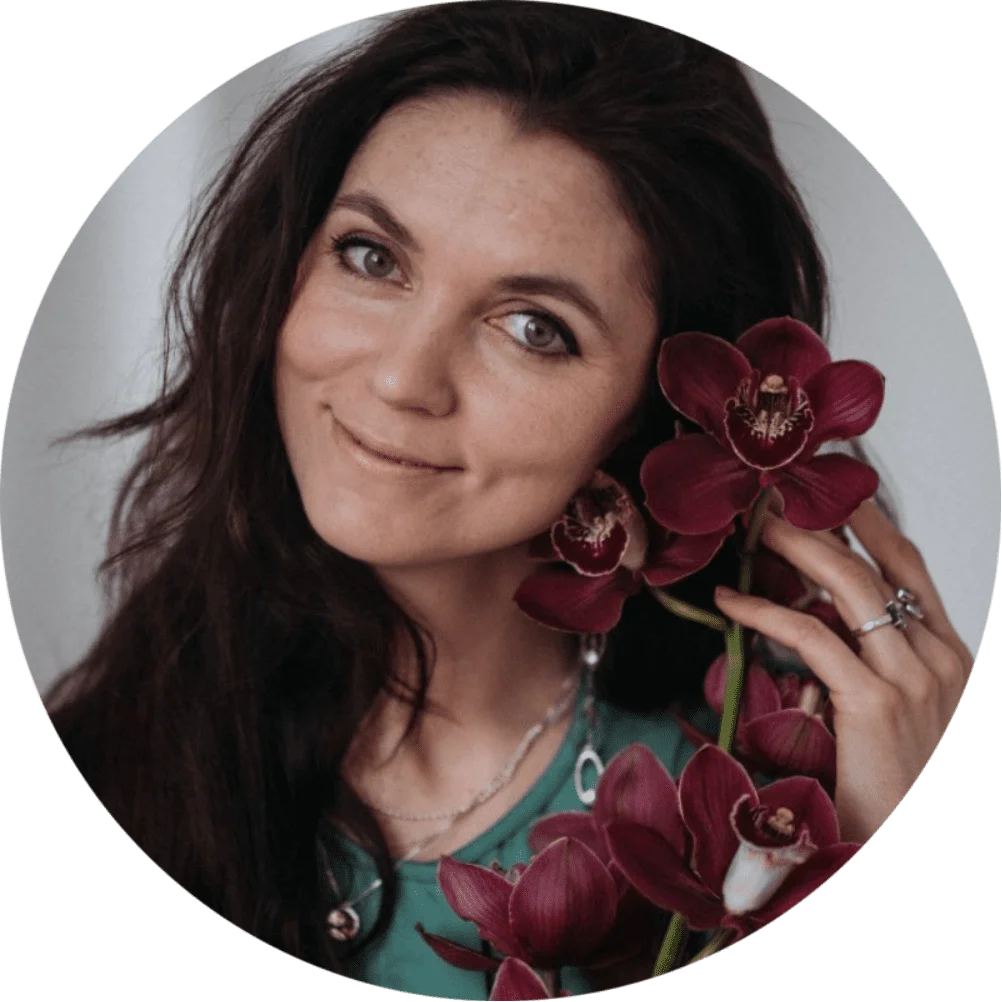
Tetiana Usoltseva
TutorTRE® certified provider. Rehabilitation therapist by education. In the process of completing the International Training in Biodynamic Craniosacral Therapy (BCST). Teacher of Tribal Fusion and dance-body practices since 2009.
Accreditation
After successful completion of the training, graduates will be certified as Biodynamic Craniosacral Therapists (BCST). The names of the specialists will be entered into three registries: Institute of Biodynamics, Body College and International Affiliation of Biodynamic Trainings (IABT).
-

The training is accredited by the Biodynamic Health Institute. We are developing the standards of practice of Biodynamic Craniosacral Therapy (BCST) in Ukraine.
-

The training is accredited by theBody College, which, under the leadership of Steve Haines, provides a standard of practice in England and Switzerland. It is a co-organiser in Ukraine.
-

The training course is part of the International Affiliation of Biodynamic Trainings (IABT), which sets the standards for BCST training courses.
-

The training is fully accredited by the Craniosacral Therapy Association (CSTA), the professional body that maintains standards and represents therapists in the UK.
Benefits of BCST training with us
-
A team of experienced and internationally renowned tutors who create an open learning space that encourages exploration;
-
A holistic training programme with practice and support between workshops, making it self-sufficient and contributing to the graduation of effective, successful practitioners;
-
A student-teacher ratio that promotes supportive group dynamics and empathetic feedback - up to 24 students per group, accompanied by core tutors and certified assistants, 1 to 5 students;
-
We accept motivated students ready to complete the entire training, which forms a powerful team for growth and a comfortable atmosphere;
-
To support the learning process, the course is provided with detailed 60-70 page methodological materials for each workshop;
-
For better absorption of the programme, we provide lifetime access to video recordings of the seminars (with high quality recordings) and other materials;
-
There is a student clinic to build confidence in practice;
-
We offer one of the best certifications in the world;
-
Training is accompanied by professional translation;
-
We provide flexible payment options;
-
We offer the prospect of postgraduate professional development and growth, as well as paid participation, as an assistant, in subsequent courses and other projects of our Institute.
Cost of training in biodynamic craniosacral therapy
The group can accommodate up to 24 people. To reserve a place, you need to pay a deposit of 680 euros, which is the fee for the first seminar. Then you can choose one of the payment methods:
1. By instalments (440 € savings). The first instalment of 1500€, which must be paid at 1 seminar. Second instalment of 1500 €, payable at the 3rd seminar. Third instalment of 1500€, payable at the 5th seminar. The fourth instalment of 1500€, payable at the 7th seminar. The total tuition fee (including the deposit) for Ukraine is now 6680€ instead of 7̶6̶5̶0̶€̶, as in neighbouring countries.
2. Loan. 23 monthly instalments of 280€. The first instalment is due at the first seminar. Subsequent payments are made by the 30th of each month. The total tuition fee (including deposit) for Ukraine is currently 7120€ instead of 8̶0̶0̶0̶€̶, as in neighbouring countries.
Rules and additional costs. Participation is confirmed by an obligation to pay the full course fee. Payment is made in UAH at the exchange rate on the day of payment. You need to agree on the exchange rate with the organiser. The fee is non-refundable. Individual therapy is paid separately at the hourly rate of the therapist in our clinic. There may be additional costs if you do not hand in your homework or pay on time.
Enrolment in the BCST course
An interview will be held before the course, which is an important part of the enrolment process. It is assumed that candidates have already attended several appointments with a certified therapist or attended an introductory seminar and studied our open materials. It is important that potential candidates have the right intentions and experience to begin their training, as it requires a great deal of personal and therapeutic effort.
Please make sure that you are able to attend all the scheduled training modules and that you are familiar with the rules of participation. The number of places on this programme is limited to 24 students. Therefore, if you are interested, please sign up for the waiting list in advance. Our contacts for communication and consultation are below. We will be happy to advise you.
Questions about BCST training
-
WHERE CAN I FIND OUT MORE ABOUT BIODYNAMICS? MATERIALS
We have a Biodynamics Clinic page where we have tried to convey the essence of Biodynamic Craniosacral Therapy in a clear and comprehensive way. Be sure to read it if you haven't already. Also, one of the best ways to get acquainted with Biodynamics is to experience the method as a client of our clinic. You can sign up for a face-to-face session in Kyiv.- DESCRIPTION OF THE METHOD
- We have prepared materials for people who are interested in learning Biodynamic Craniosacral Therapy. Important articles and webinar recordings with our teachers that will help you go deeper into the essence. Follow the link and get free access to the materials. Available in Ukrainian or Russian only.
- INTRODUCTORY MATERIALS
- You can find the dates of one-day in-person orientation seminars in the training schedule. They are not mandatory for admission, but they can give you a really good insight into the training, the method and help you make a decision about enrolment. You can also ask the organiser to attend a class that is currently in progress to get a feel for the atmosphere and meet the teacher.
- We try to make good publications and live broadcasts about Biodynamics in our social networks:
-
Instagram page
-
Telegram channel of the Institute
-
Facebook page
-
HOW IMPORTANT IS THERAPY EXPERIENCE FOR ADMISSION?
Everyone can learn Biodynamics, but it is important to have personal motivation, organise enough practice and follow our programme. Whether you are a psychologist, osteopath, craniosacral therapist or just decided to embark on the path of therapy for the first time, the principles of Biodynamics are so unique that it will be a new experience for many.- For people who already have experience with bodywork, it sometimes takes an effort to change their working habits and really move towards biodynamic principles. On the other hand, you may find it easier to set up a practice and your knowledge of anatomy or working with people in general will be useful.
- For people who are new to bodywork, the good news is that you don't have to relearn, your hands will immediately learn the biodynamic language of communicating with the human body. You may need to work harder to start doing hands-on sessions.
- The training course includes an anatomical aspect, however, if you do not have the background knowledge or relevant education, you may need to take an additional anatomy and physiology course as part of your home study programme to gain a more complete understanding of the physical processes in the body and complete your training.
- Some students may need more of their own therapy to better self-regulate, be more grounded and in better touch with their body's world of sensations to be more sensitive to the processes during the sessions.
-
WILL TEACHERS COME TO UKRAINE NOW?
Definitely, yes! They are already travelling to teach the 2021-2024 class. Starting in February 2023, our teachers continue to come to Kyiv every two to three months. -
WHAT IF I CANNOT ATTEND ALL THE DAYS OR MODULES?
Attendance at all days and modules of the International Certification is required. If your life circumstances force you to miss a number of training days or even a seminar, we have three ways to catch up:- 1. You can catch up on the practical part with your mentor. A mentor is an assistant or junior lecturer assigned to you. For one day of a missed seminar, you need to take 1 hour of work with a mentor. Or 6 hours if you missed the whole seminar. The tutor's time is paid separately. This method works only for one missed seminar. If you have more absences from the course, see the 2nd method.
- 2. Take a similar seminar with the next training stream. No additional costs are required. However, you will have to wait a long time to complete the training and receive certification.
- 3. Take a similar seminar abroad with our teachers. This option requires a lot of additional costs and a good command of English.
- Please note that the basic payment plan does not change depending on your absences. In addition, we provide all students with access to high quality video recording and teaching materials.
-
WHAT ARE THE DEADLINES FOR COMPLETING THE REQUIREMENTS FOR CERTIFICATION?
To be certified, you need to fulfil all the conditions of training, namely full payment of tuition, attendance at all seminars, your tutors must accept your homework and thesis, you need to conduct 150 sessions of free therapy as part of your training and receive 16 sessions of private therapy from a certified therapist of our institute.- If you do not manage to complete the requirements by the day of certification, you will be given 6 months to complete them. At the same time, you have to take an additional 2 hours of supervision from a tutor every month. Supervision is paid for separately.
- If you do not complete the requirements in the additional 6 months, you will have to start your studies from the beginning to obtain certification.
- Homework is due 14 days before each seminar. The thesis is due 14 days before seminar 9. Our tutors set aside this time to check your work and give you feedback. If you hand in your assignments late, our team has to allocate additional time. If you submit your assignments late, you will pay an additional 20 euros to the tutor for each assignment. Or the cost of a tutor's hour of work, if it concerns the verification of a thesis submitted late.
-
MORE RULES ABOUT PARTICIPATION AND PAYMENT
We try to provide a lot of support during your studies and make it possible for you to get the best possible education in Ukraine. For this reason, we have certain frameworks that we must inform you about and that you agree to by enrolling in the training.- The organiser has the right to refuse participation if the intentions or level of familiarity with the method does not meet our needs, or if there is an overlap of roles or other circumstances that may interfere with the learning process.
- The organiser reserves the right to change the dates and venue of the seminars. The organiser may also swap the topics of the seminars and add or change teachers if the need arises.
- Individual therapy is paid separately at the hourly rate of the therapist in our clinic. That is, it is not included in the tuition fee, which gives you the opportunity to choose a therapist. Only those sessions that you attend after the start of your studies are counted. If you are unable to attend our clinic or training assistant sessions, with justified reasons, we will help you find and choose another therapist who is a member of the International Association of Biodynamic Training. In this case, the style of work, depth and quality of work may differ.
- Participation is confirmed by the obligation to pay the full course fee. The fee is non-refundable. Unless the organiser decides to cancel the training or the training cannot be held more than 3 months after the announced date of the training.
- Failure to pay for the course within the established timeframe is subject to a penalty of 20 euros. We will make an accommodation if you have justified life circumstances that make it impossible to pay on time and you have notified the organiser in advance. In cases where we have met you halfway and allowed you to pay later, and you decide to leave the course afterwards, you will still need to pay the difference.
-
WHERE IN THE WORLD IS THE CERTIFICATION RECOGNISED?
Our diploma confirms the qualification of a Biodynamic Craniosacral Therapist (BSCT) after successful completion of a 700-hour course over two years and fulfilment of all theoretical and practical requirements.- The certification is recognised in the United Kingdom, Canada, Switzerland, North America, most European countries, Australia, New Zealand and Southeast Asia. This list is growing. In some countries, such as the UK or Switzerland, you can even accept people with insurance.
- But being recognised doesn't mean that the certification is enough to work freely there. Much depends on your citizenship, residence permit, and official employment.
- Some countries require mandatory local language training, and sometimes, as in Latvia, they require specific local training to work with people regardless of your education. If you have a goal to work in another country as a Biodynamic Craniosacral Therapist, it is important to take into account these subtleties and clarify about a specific country.
- In Ukraine, it is enough to register as an individual entrepreneur for certain quests to work as a biodynamic craniosacral therapist. Or you can get a job in a clinic or therapeutic centre.

